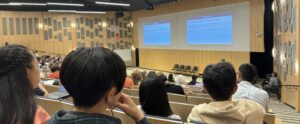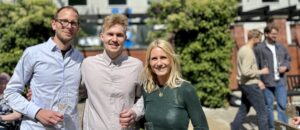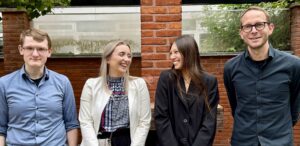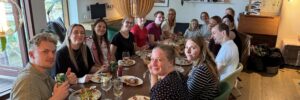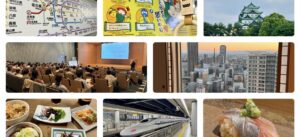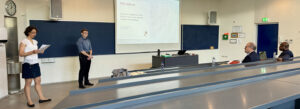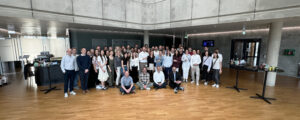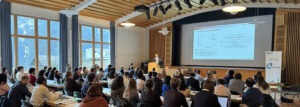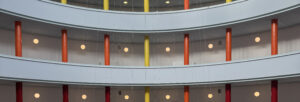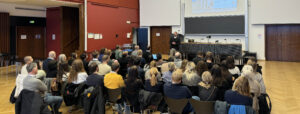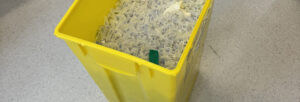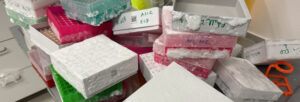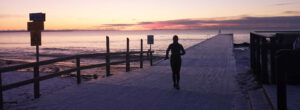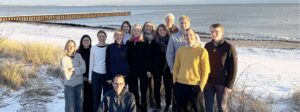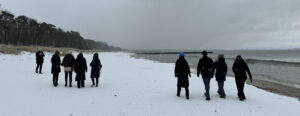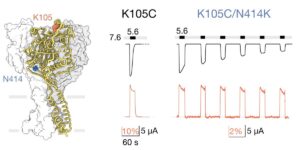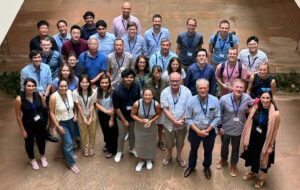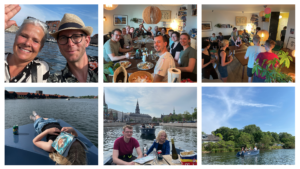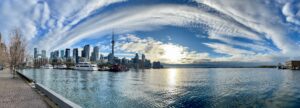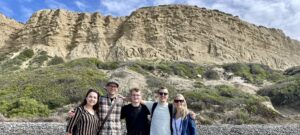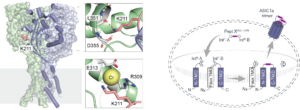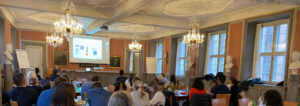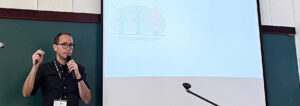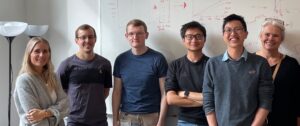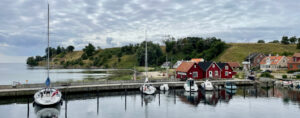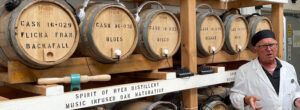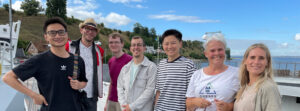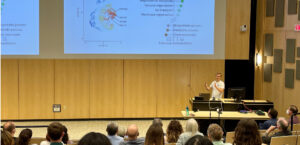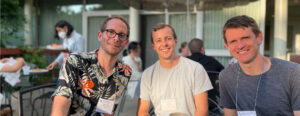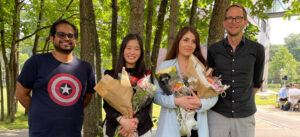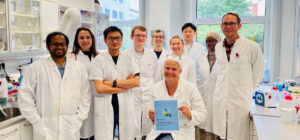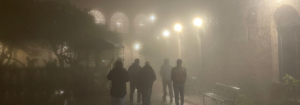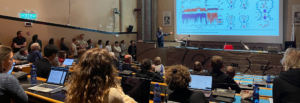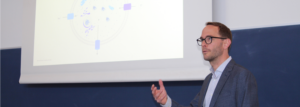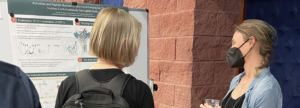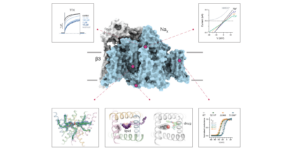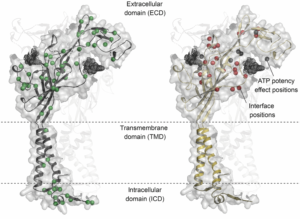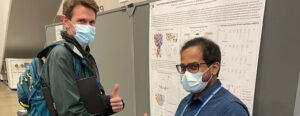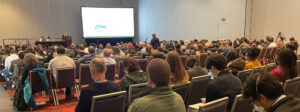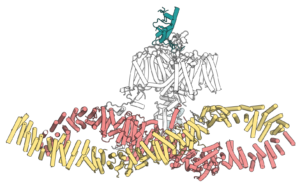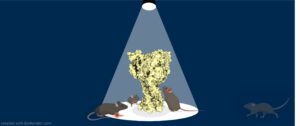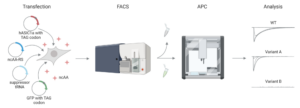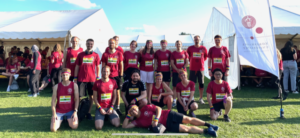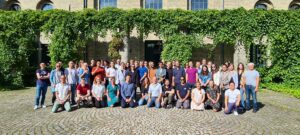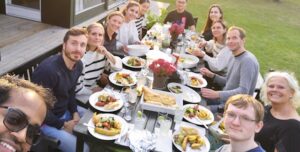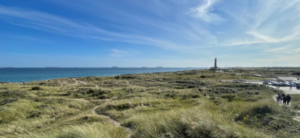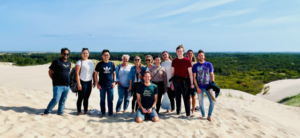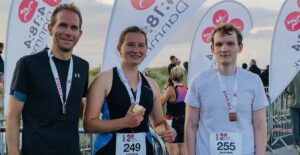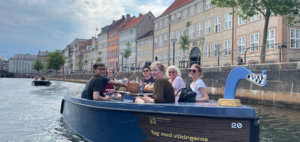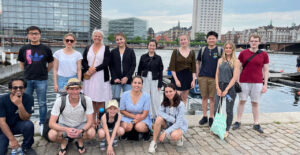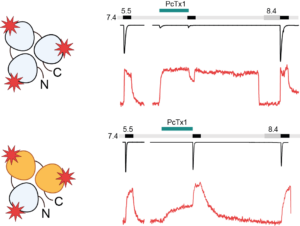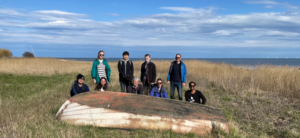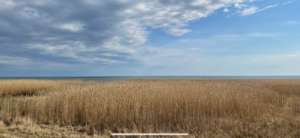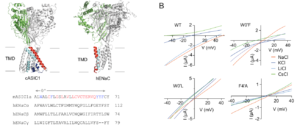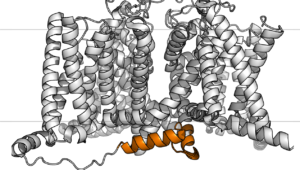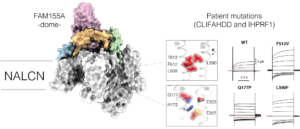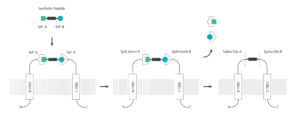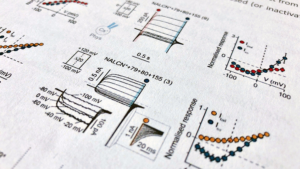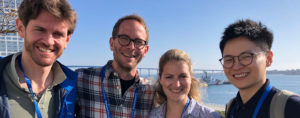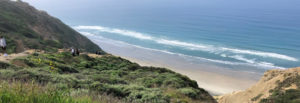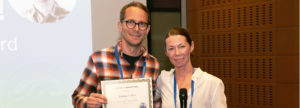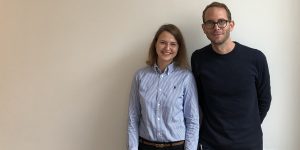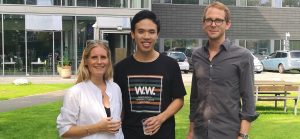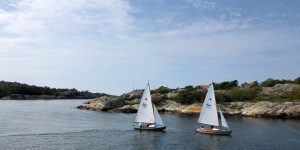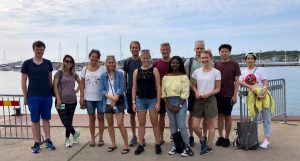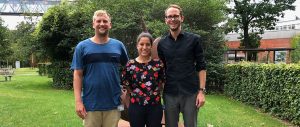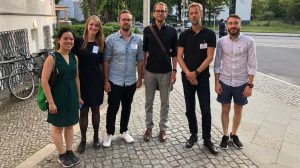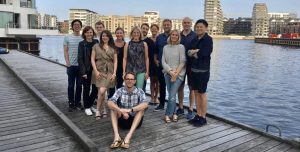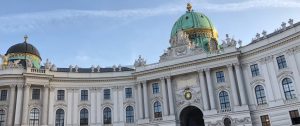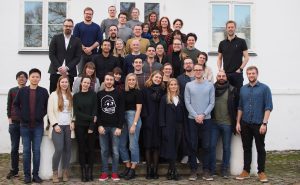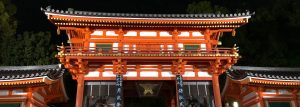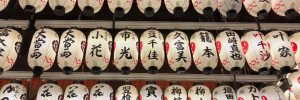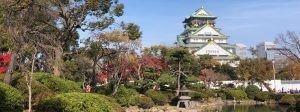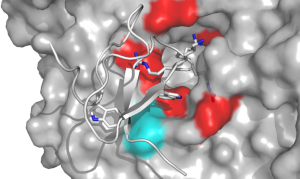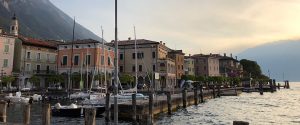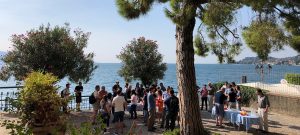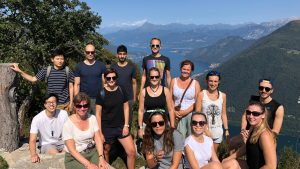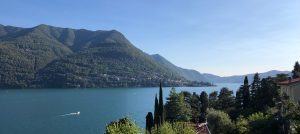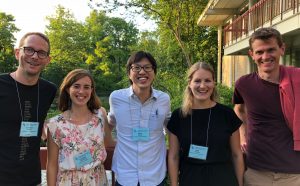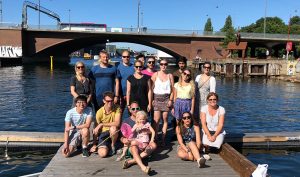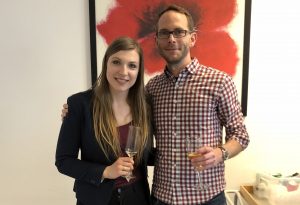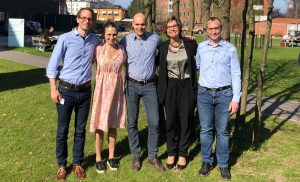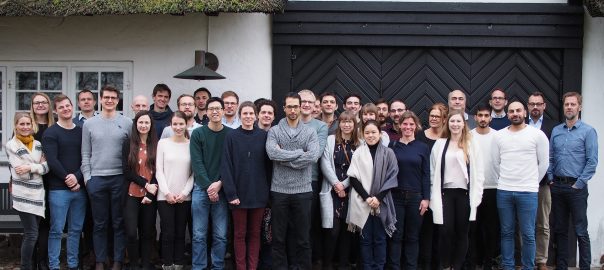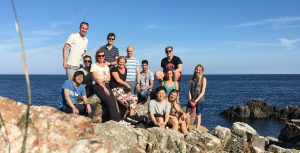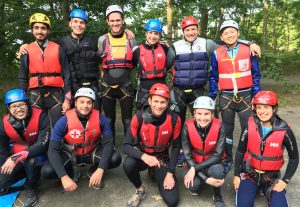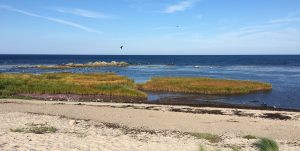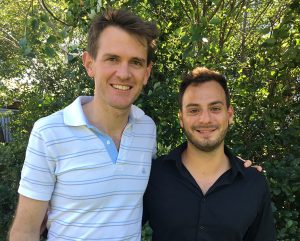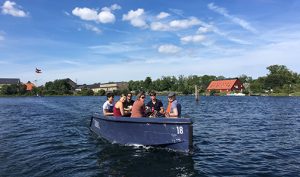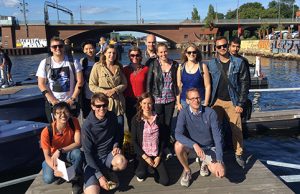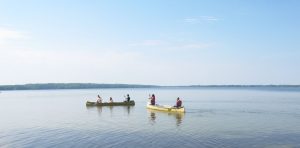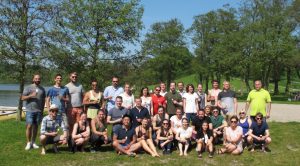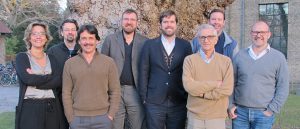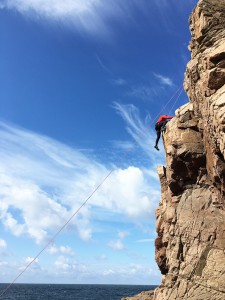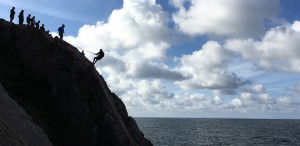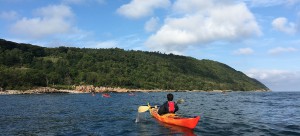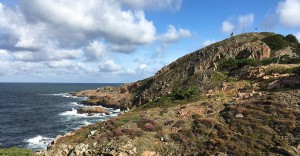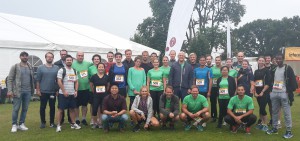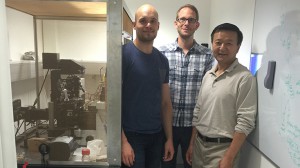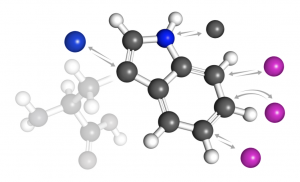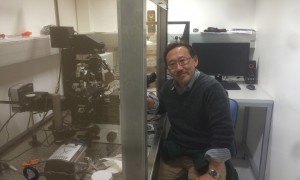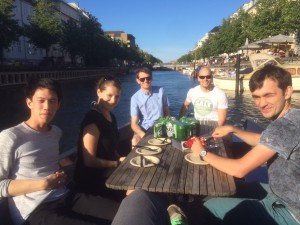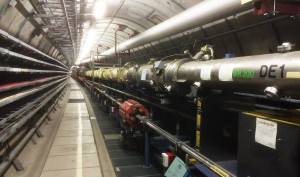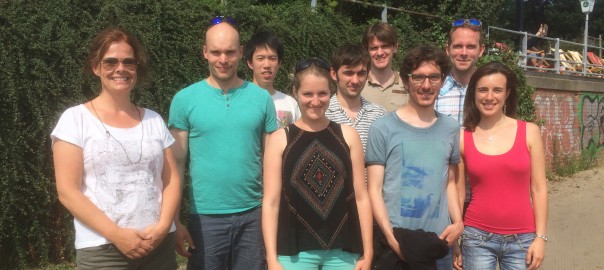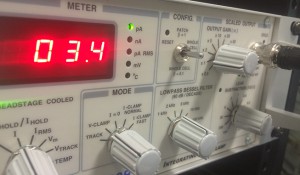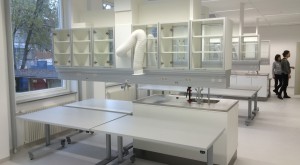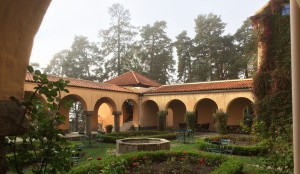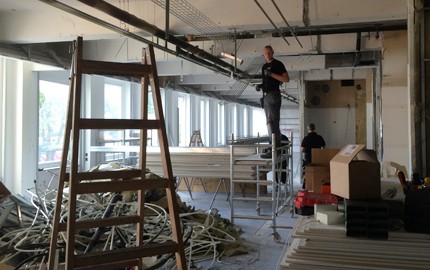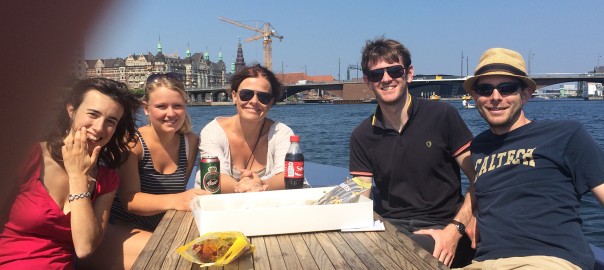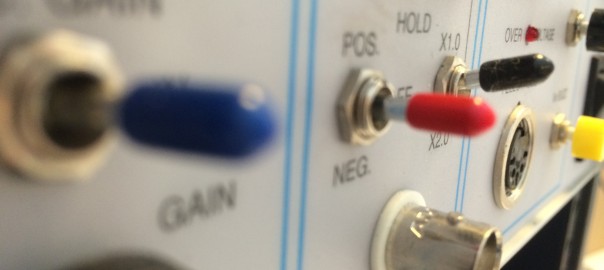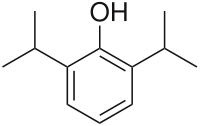Mette, Sam and Stephan in the middle of nowhere
Every two years, the ion channel community gathers somewhere in the middle of nowhere east of Boston to consume copious amounts of caffeine and chat about their favourite proteins. This provided Mette, Sam and Stephan with an opportunity to showcase some of the lab’s work on ASICs and NALCN (and catching up with former postdoc Chow) – big thanks to Baron and Teresa for organising a terrific geek fest!
Congrats to Emma
Emma takes home a poster prize at the ULLA summer school in Leiden, Netherlands – congrats and thanks for representing the lab!
Congratulations to our MSc students
Big congratulations to our MSc students Ann Sofie, Natasja and Mikkel for successfully defending their thesis work! Their all did a great job in the lab, and really helped advance our work on NALCN and P2X7 receptors, respectively – and they no doubt will be missed! Big thanks also to their supervisors Mette and Hendrik for guiding them through their projects.
Stephan far from home
Stephan was invited to speak at the fantastic 9th edition of the Chemical Protein Synthesis meeting in Nagoya, Japan. The conference featured the latest and greatest on how to make proteins from scratch and provided a great platform to present our protein semisynthesis work – big thanks to the organisers for including our ion channel work!
Welcome Emanuel
Emanuel Rodriguez from the Simmons group at the Charité Berlin will be joining us for a couple of weeks to work on a potential functional coupling between different kinds of ion channels as part of his PhD. Welcome on board!
New paper on NALCN pharmacology
Led by former postdoc Chow (now group leader in Sydney), the work was just published in PNAS. The study was started by former MSc student Katharina, and later expanded by contributions from Sam and our collaborators in the Carnevale lab. It outlines that the lateral fenestrations do indeed block access to a hidden drug binding site with the NALCN pore module and reveals a potentially promising pharmacophore to pharmacologically target NALCN in the future. Congrats to everyone involved!
Congratulations to Hendrik
Big congratulations to Hendrik for successfully obtaining his PhD! Hendrik did a great job defending his thesis work on the regulation of NALCN by G proteins in front of his assessors (and membrane protein experts) Profs Henry Colecraft (Columbia University, USA) and Poul Nissen (Aarhus, DK) and committee chair Céline Galvagnion-Büll (ILF). Very well done and we look forward to having you around for a little longer!
CBP reunion
10 years after its inception in 2014, we got a chance to catch with former and current members of the CBP. This involved a small symposium, followed by a reception and it was great to see so many show up from all over Europe. Big thanks to Federica for the idea and to Iacopo and Christian for helping to make it happen!
Welcome Laura!
Today, Laura Hellriegel joined us for an 8-week internship. She will be joining Emma in her efforts to work on inhibition of NALCN – welcome and we look forward to having you around!
A trip to St Louis and New York
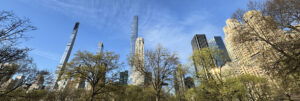
 Stephan had the pleasure of being invited to speak at Washington University St Louis, a place like no other when it comes to density of ion channel geeks – big thanks to host Baron Chanda for organising a fantastic visit. On the way there and back, the trip also afforded the possibility to catch up with collaborators in New York, making for a very exciting trip!
Stephan had the pleasure of being invited to speak at Washington University St Louis, a place like no other when it comes to density of ion channel geeks – big thanks to host Baron Chanda for organising a fantastic visit. On the way there and back, the trip also afforded the possibility to catch up with collaborators in New York, making for a very exciting trip!
ASIC paper accepted in Biophysical Journal
Congratulations to Caroline, Asli and Johs for having completed this epic fluorometry effort under Stephanie’s guidance. The project started a few years back and, after the obligatory twists and turns, resulted in some really neat insight on the conformational landscape of ASICs under different desensitising conditions. Big thanks to everyone involved!
Hendrik talks far from home
Hendrik ventured to Ventura, California to participate in the GRC on ‘Ligand recognition and molecular gating’. In fact, he was invited to give a talk at the preceding GRS on his work on G protein regulation of the NALCN channelosome . Thanks to organisers including our work in the program!
Stephanie talks about ASICs at BPS
Congrats to Stephanie for being selected for an oral presentation at BPS 2024 to talk about some of her recent ASIC work using VCF and split inteins. And big thanks for representing the lab in Philly in the first place!
Welcome Camilla
We have the pleasure of welcoming our new lab tech intern, Camilla Lindskog, to the team. We look forward to having you around!
Sodium channel meeting in Switzerland
Nadine, Laurie, Hendrik and Stephan ventured far into the Swiss mountains to attend the first-ever Worldwide Sodium Channel Conference in beautiful Grindelwald. Big thanks to the whole organising team for putting together an interesting program – and letting us present some of our Nav1.5 and NALCN work!
News on NALCN pharmacology
After bringing on board external collaborators for some simulations, and Sam for additional mutant characterisation, Chow put together the updated version of the NALCN pharmacology work started by Katharina. You can read the latest version HERE.
LEAF day 2024
In an attempt to improve sustainability and efficiency of our lab and those of some of our CBP neighbours, Hendrik put to together a productive full-day program. A bunch of overhauled protocols and procedures and literally thousands of discarded samples later, we are hopefully a step closer attaining LEAF Gold status. Big thanks to everyone involved!
New ASIC preprint
Congratulations to Stephanie, along with the students trained by her on this project (Asli, Johs and Caroline), for leading this intriguing VCF study on ASICs. Using many beautiful VCF recordings they provide insight into how the ASIC1a ECD moves under different desensitizing conditions. Read the whole story on bioRxiv.
Latest ASIC paper published
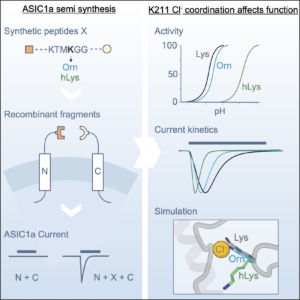 The manuscript on our protein engineering efforts with ASIC1a is now published in Cell Chemical Biology. The work represents a nice example of how protein engineering, electrophysiology and computational approaches can be combined to provide atomic-scale insight into ion channel function. Big thanks to all authors and to our funding sources Lundbeck Foundation and DFF.
The manuscript on our protein engineering efforts with ASIC1a is now published in Cell Chemical Biology. The work represents a nice example of how protein engineering, electrophysiology and computational approaches can be combined to provide atomic-scale insight into ion channel function. Big thanks to all authors and to our funding sources Lundbeck Foundation and DFF.
Funding from Carlsberg Foundation and Hartmann Fonden
We are very grateful for having received equipment grants from the Hartmann Foundation (Nadine received co-funding for a patch-clamp setup) and the Carlsberg Foundation (Joe Rogers spearheaded an application for a peptide analyzer).
Another trip by Stephan
After years of delay (thank you, Corona), Stephan finally got to visit the NIH and Yale. Despite a very dense itinerary, this turned out to be a very inspiring trip with lots of input and interesting discusssions. Big thanks to the hosts Kenton Swartz and Ana Fernandez-Marino (NIH) and Jean-Ju Chung (Yale) for organising two fantastic visits!
Stephan speaks in Würzburg
Stephan had the pleasure of being invited to speak at the student-organised EUREKA symposium of the life sciences graduate school in Würzburg – big thank you to the organisers for giving us a chance to highlight some of our work.
Welcome Janina
Today, we are delighted to see Janina Sörmann join our team. She joins us as a postdoc and will be working on generating peptide binders against ASICs. Welcome and we look forward to having you around!
Mette is off to speak in Münster
Congrats to Mette for being invited to speak at the ChemBion Graduate School at the University of Münster, Germany. She will be representing the lab by talking about her work on ASIC-mediated protein-protein interactions.
First-ever NALCN workshop
After many trials and tribulations during the planning phase, the 1st NALCN workshop, held in Alicante, Spain, was a resounding success. Thanks to the generous support by our sponsors, we were able to bring together researchers, physicians and patient families from all over the world. Big thanks to all participants for an inspiring meeting.
Welcome Laurie
Welcome to Laurie Peverini, who joins as Marie Curie postdoc. For the next two years, she will be working on split intein-based approaches to study Nav1.5. Welcome and we are excited to have you on board!
Stephan talks in Basel
Stephan had the honor of being invited to present some of our semi-synthesis work on ASICs and Nav1.5 on the Peptide Therapeutics Forum in Basel, Switzerland.
Welcome to Team MSc
With Ann-Sofie, Natasja and Mikkel joining, we welcome 3 new MSc students to the team. Ann-Sofie and Natasja will be digging into NALCN regulation with Hendrik, while Mikkel will dive into P2X receptors with Mette. Looking forward to having you all around!
Stephanie speaks in Scotland
Stephanie speaks at the 2023 Membrane Transport meeting of The Physiological Society (Recent Research into Ion Channels, Transporters and Epithelial Physiology). Stephanie will present her work different approaches to engineer ASICs. Big thanks to the organizers for putting together an exciting meeting and program.
CBP all sporty at the KMD
Together with some trainees from our neighbours, the Olsen lab, a bunch of lab members took part in this year’s KMD sprint triathlon at Amager Beach – the weather was great and the spirits were high! Big thanks to the organisers, participants and spectators alike!
Welcome Tomma
Today, we welcome Tomma, a summer intern who will work with Hendrik on NALCN for the next three weeks. Welcome to the team!
Feng is off to the UK
Feng will work at the University of Cambridge until January 2024 as his stay abroad – have a great time over there and best of luck with your project!
Updated preprint
The updated preprint on our protein engineering efforts with ASIC1a is now on bioRxiv. Thanks to the efforts by Stephanie Heusser and Joe Harrison (Univ of the Pacific, US) we have added new functional and computational data on how non-canonical Lys211 analogs disrupt chloride binding and channel function. Big thanks to the entire team for their resubmission efforts – and to our funding sources Lundbeck Foundation and DFF.
Welcome (back), Nadine
After an internship in 2022, we are delighted to welcome Nadine Ritter back to the lab! She just completed a productive PhD project and joins the lab with a MSCA postdoctoral fellowship to work on NALCN – welcome back, we’re looking forward to having you around!
Mette speaks at GRC
Mette had the honour of being invited to present her latest efforts on an channel-transporter interaction at the Mechanisms of Membrane Transport GRC in Switzerland – congrats!
Congrats to Victor
Congratulations to Victor for successfully defending his MSc work! He used – under the supervision of Sam Usher and Alex Hauser – a variety of bioinformatics approaches to study NALCN and we look forward to testing some of his predictions. Special thanks to his supervisors for their efforts with this project!
Caroline defends her MSc thesis
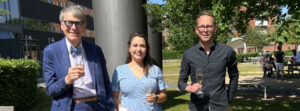 Congratulations to MSc student Caroline for successfully defending her thesis work! It was an absolute pleasure to have you around, we’re grateful for all the progress on the project and wish you all the best for the future Special thanks to Stephanie for fantastic supervision.
Congratulations to MSc student Caroline for successfully defending her thesis work! It was an absolute pleasure to have you around, we’re grateful for all the progress on the project and wish you all the best for the future Special thanks to Stephanie for fantastic supervision.
New DFF grants
We are very grateful to have received funding from DFF for our ongoing efforts with NALCN, as well as ASIC. The latter grant is a collaboration with the labs of Henriette Autzen and Joe Rogers and we hugely look forward to getting this off the ground together with them. Watch this space for updates on the projects.
Lab members on the road
Our TEVC rigs are less busy than usual these days because Hendrik and Sam are busy patching neurons abroad. Specifically they are visiting the labs of Arnaud Monteil in Montpellier and Christian Rosenmund in Berlin, respectively. Happy recordings and we look forward to welcoming you back later in the year!
Toronto 2023
Stephan was hosted by Lundbeck Foundation Collaborative Grant collaborator Prof Mei Zhen at the Lunenfeld-Tanenbaum Research Institute, before visiting Adriano Senatore at the University of Toronto Mississauga, as well as a short stint at ProteinQure. Big thanks to the hosts and to everyone involved for inspiring discussions and input.
New preprint on NALCN pharmacology
NALCN is notorious for its resilience towards pharmacological manipulation. In our latest preprint, we find that unplugging DI-DIV and DII-DIII lateral fenestrations reveals an unexpected pharmacology. All credit goes to former MSc student Katharina Schott and to former postdoc Han Chow Chua, now lecturer at the University of Sydney, for leading this project. The full story can be found HERE.
Tim in town
4 years after his move to Bergen, Norway to set up his own lab, we had the pleasure of hosting Pless lab alumus Timothy Lynagh. It was great to have him in town and to hear about all the cool ion channel work they have going on up there near the Polar Circle! Thanks for swinging by, Tim, and very nice to see your lab doing so well!
NALCN workshop in Alicante, Spain
Registrations are now open for the first-ever workshop on NALCN with the goal to bring together PATIENT FAMILIES, PHYSICIANS and RESEARCHERS to improve the lives of patients. The event is hosted by the Libellas Foundation.
For registration with hotel accommodation sign up until March 31st at nalcn2023.org
Genetic code expansion talk
Stephan was fortunate enough to be invited to contribute to the virtual genetic code expansion (GCE) seminar series. This was a welcome opportunity to share some of our recent efforts on introduction of non-canonical amino acids into ASICs. A recording of the talk can be found HERE.
Welcome back!
Stephanie returns from maternity leave to re-join our efforts on ASIC, while Emma starts her PhD work on NALCN. Welcome back and we hugely look forward to having you around (again)!
Two Marie Curie Fellowships
Delighted to share the news that we will have two incoming Marie Curie Postdoc fellows this year! Nadine Ritter will re-join the lab to work on NALCN and Laurie Peverini will start working on splicing in Nav1.5 – big congratulations to both and we look forward to having you around from later in the year!
More newcomers
Victor is a MSc student that will team up with Sam (and Alex Hauser) to work on computational approaches on the NALCN complex and Mikkel is a project student who will join Mette in her quest to unravel the functional consequences of protein-protein interactions in ligand-gated ion channels.
Hello and farewell
Time to say a big thank you to Fadumo, who has been a terrific lab tech intern over the past year. Your help was greatly appreciated and we wish you all the best for the future. At the same time, we welcome Hanna to the team, who will be our lab tech intern for the next 12 months – we look forward to having you around!
New manuscript on bioRxiv
Our latest endeavours into protein engineering show that ASICs are exquisitely sensitive to side chain length and charge at a conserved Lys in the extracellular domain – one carbon can make all the difference! Big thanks to postdocs former postdocs Debayan Sarkar and Iacopo Galleano for leading this effort, assisted by former MSc students Sofie Ou and Gül Uzun, as well as the contributions by lab alumnus Keith Khoo and Gerbrand J.v.d.H. van Noort from Leiden (Netherlands)! We are very grateful for funding by the Lundbeck Foundation and the DFF. The current version of the manuscript can be found HERE.
New grant from the Lundbeck Foundation
We are very grateful for a Lundbeck Foundation Collaborative Project grant. This will enable us to study and target the sodium leak channelosome together with the group of Prof Mei Zhen in Toronto over the next five years.
Thanks for 2022
2022 was an exciting year, with lots of progress in the lab, new faces, sad goodbyes, finally some conferences again and plenty of ideas to keep us occupied for the year(s) to come. Big thanks to all the many contributors and their ceaseless efforts to keep the lab running (and make it more green!), as well as their curiosity and perseverance to push our projects forward!
Congratulations to Claudia
Congratulations to Claudia for successfully defending her PhD thesis! Her work focused on studying the effects of disease-causing mutations in the NALCN channelosome and contributed to classifying them according to the type of mutation. We wish her all the best for her future and also thank her thesis assessment committee, Hanne Poulsen, Arnaud Monteil and Petrine Wellendorph
Talking about split inteins in California
After a long Covid-related delay, the ‘Chemistry and Biology of Peptides’ GRC finally went ahead in Ventura, California. Big kudos to the organizers for putting together an exciting and diverse program covered a staggering array of peptide science – a big honor for the lab to be able to showcase some of our intein magic!
Lab represented at SHIFT 2022
Stephan had the honor of presenting some of our ASIC work at the second “Doing biology with light” meeting on Tenerife. Big thanks to Drs Teresa Giraldez and Andrew Plested for putting together a very inspiring meeting in a spectacular place. Fingers crossed the third iteration of “Doing biology with light” is not too far off!
Nadine and Hendrik present at Europhysiology
The Europhysiology 2022 meeting brought an abundance of physiology experts to town, including some interested in ion channels. This presented a great opportunity to showcase some of our recent efforts to incorporate non-canonical amino acids and post-translational modifications into Nav1.5 and NALCN, presented by Hendrik and Nadine, respectively. It also provided a welcome opportunity to catch up with collaborators and friends!
Visit by NALCN expert
This week, we have the pleasure of hosting Dr Arnaud Monteil from the CNRS Montpellier. Arnaud is an expert on many aspects of NALCN physiology and we look forward to having him around for a few days!
Lab retreat 2022
Unlike previous years, we left town only for a single day for our annual lab retreat – this time to the island of Hven. Awkwardly making our way across the island on tandem bikes, we learned about its illustrious history, incl its past as the former basis for Tycho Brahe’s astronomy studies and its current efforts to distill liquor with the help of music – go figure! Thanks to the team for a fun day out!
Bidding farewell to Chow
After a record-breaking 6 years in the Pless lab, Chow moved on to new adventures – for which we wish him all the very best! He deserves huge credit for helping to lift NALCN (and its auxiliary proteins) from relatively obscurity back into the ion channel limelight – and giving us plenty of work on (and things to think about) for the years to come. Thank you for your many contributions, you will be missed!
Sam talks at channel GRC
After various pandemic-related delays, it was finally time for the ion channel GRC in Mt Holyoke again. Sam and Stephan got treated to a fantastic line-up of speakers and Sam did a great job presenting his latest effort into identifying new interaction partners of the NALCN complex. Huge thanks to the organisers for a fun week full of channel magic!
Congratulations to Gül and Sofie
Big congratulations to Gül and Sofie for passing their MSc thesis defense yesterday. They both did a fantastic job over the past 9 months learning about and working on split intein-mediated protein splicing on acid-sensing ion channels. They made a huge contribution to the project and we wish them all the best for the future!
Two more farewells
We had a nice farewell breakfast for Debayan and Stephanie. Luckily, it is only a temporary ‘Auf Wiedersehen’ for Stephanie, as we can look forward to her returning after parental leave to continue her ASIC adventures! Debayan will move onto new endeavours elsewhere, for which we wish him all the best! We are very grateful for him deploying the split intein magic on an entire zoo of different channels for the past two years – and for always being a cheerful lab mate and dedicated supervisor!
LEAF Bronze status for Pless lab
Thanks to the efforts by Janne, Fadumo and Hendrik, the lab has now achieved the Bronze level certification status of the LEAF program. The programs aims at making laboratories (and the work in them) more sustainable and we hope to tackle Silver status next!
Goodbye to Iacopo and Nadine
After 5 months as an exchange PhD student, it was time to say goodbye to Nadine – and thank her for astounding amount of NALCN patching she got done in this short time period! We wish her all the best for the remainder of her PhD and very much hope to see her again in the future!
Iacopo had been in the role of the resident (and later remote) Pless lab peptide magician since 2018 and will be missed on all levels! Thank you so much for all your amazing contributions to the many projects you were involved in and, most importantly, for enabling the intein magic around here in the first place! We miss you (and your pink shirts) already and wish you all the best for your new adventures!
EMBO/FEBS lecture course in Erice
After being postponed twice, the EMBO/FEBS lecture course on ion channels and transporters finally went ahead in the sleepy Sicilian hill town of Erice! Not everything was as expected (think thick fog, rain and wind instead of sunshine) or hoped for (participants with Visa issues and numerous Corona infections), but the food and science part delivered: delicious local bites and a fantastic lineup of didactic and science lectures, poster sessions and many informal discussions! Big thanks to all contributors, students, speakers and, especially, our sponsors and the local organisers!
Stephan talks in Linköping
One of the many 2022 events that got postponed numerous times, the Wallenberg symposium finally took place in Linköping, Sweden – Stephan was very honored to join the great speaker lineup (and visit friends and colleagues).
That inauguration


After various COVID-related delays, Stephan finally got to celebrate his inauguration as Professor at the Dept of Drug Design and Pharmacology. Huge thanks to all lab members (past and present), colleagues and collaborators – it would have never (ever) happened without you!
Ligand recognition GRC in Lucca, Italy
Stephanie and Stephan got to attend the GRC on ligand recognition and molecular gating in Lucca, Italy. The densely-packed program did not leave much time to admire the achingly beautiful surroundings, but the science was top-notch. Big kudos to the organisers!
Structure of Nax-Nav beta3 complex
Our latest collaboration with the Payandeh and Ciferri groups at Genentech reveals the structure of human Nax/Nav2.1 in complex with Nav beta3; now out in Nat Comms. Despite looking very similar to Nav/Cav channels, its functional properties appear to diverge substantially: numerous lipids populate the pore, physiological activation mechanism remains elusive, but channel engineering suggests it is non-selective among monovalent cations, inhibited by TTX, Ca2+ and some Nav inhibitors. Cameron Noland and Marc Kschonsak spearheaded the structural efforts, while Chow masterminded the functional interrogations on our end, together with Stephanie and Nina. Big thanks to everyone one involved. Now all we need is somebody to find out how this channel is activated endogenously…
P2X2 manuscript published
After years of delays, our work on the intersubunit interfaces of P2X2 receptors finally got published! We show that subunit interfaces are missense mutation hotspots & mutations here tend to increase apparent ATP affinity. Huge thanks to everyone involved, in particular Federica Gasparri for her patience, Alexander Hauser for his contribution to the population analysis and Debayan Sarkar for getting it over the line!
Biophysics meeting 2022
Biophysics 2020 was the last in-person meeting pre-Covid, so it was only fitting that Biophysics 2022 would kick off real-life conferences again. Although only Debayan and Stephan made it to California in the end, the lab was strongly represented with 2 talks and 3 posters. Definitely exciting to catch up with friends and collaborators in person again – and big thanks to the organisers for an outstanding and diverse program, as well as for providing a safe environment.
ASIC-PcTx1 paper out now
After many years of work, our epic effort into figuring out the mechanism and stoichiometry of how the peptide toxin PcTx1 inhibits ASICs is finally published in eLife. This really was a long-term effort and a great collaboration between Stephanie and Christian – thank you for your persistance and for generating very thorough mechanistic insight into this tricky problem!
Hi and goodbye
Yesterday, it was time to say farewell to our 2021-2022 lab technician intern Marijana. Big thanks for all her help and we wish her all the best for the future! Today, we say hi to Fadumo, who will be our 2022-2023 lab technician intern – welcome to the team!
Welcome Nadine
Today, Nadine Ritter joins us as a visiting PhD student from the University of Muenster, Germany. She will be working on NALCN with Sam for the next 4 months. Welcome and we look forward to having you around.
Say hi to 2022
While we say hello to the new year, I would like to take the opportunity to thank the amazing Pless lab team for hanging in there during the past 12 months. Certainly not everything went to plan and Corona did its best to make things tricky, but I am very grateful for everyone’s efforts and enthusiasm to push things forward! Here is to the new year, along with all the highs and lows it may bring. Looking forward to seeing all the exciting projects progress!
Structure of NALCN channelosome published
After years of work and a big team effort, our structure-function effort on the entire NALCN channelosome is now published in Nature. Together with our fantastic collaborators (Payandeh and Ciferri labs @ Genentech, Manu Ben-Johny @ Columbia, and Alexander Leitner @ ETH), we show that UNC79/80 form a massive figure-8-like HEAT repeat assembly below the channel, CaM co-purifies as a surprise passenger and single channel data reveal very low Po. Check out all the details HERE. Congratulations to the entire team, especially Marc Kschonsak and Han Chow Chua, who took the lead on deciphering structure and function of this massive complex. We are very grateful for support by the Carlsberg Foundation, DFF and the Lundbeck Foundation. Lastly, congratulations also to Kang & Chen, who preprinted very similar work HERE.
Infrastructure grant from Carlsberg Foundation
We are very grateful for an infrastructure grant from the Carlsberg Foundation that will support our efforts to decipher the function and structure of the NALCN channelosome.
Stephan talks in Stockholm
After what felt like an eternity, Stephan got to talk in person again abroad – big thanks to Lucie Delemotte and Reba Howard for hosting a fun visit at the SciLife Labs in Stockholm!
Welcome Paolo
Today, we welcome Paolo Zucculini from Italy, who will do a short stay in our lab to get some experience in VCF recordings.
Our first-ever review on ASICs
Congrats to Stephanie for this epic effort to assemble an overview of what animal models have taught us about the potential of acid-sensing ion channels as therapeutic targets. Apart from the well-studied stroke implications and the tricky area of pain, ASICs may turn out to be suitable targets in a number of other diseases – check out the details here.
New paper out in PLoS Biology
After many years of big efforts, Nina’s paper on incorporation of photo-crosslinking ncAAs is finally out in PLoS Biology. The project took many twists and turns, but thanks to the courage and tenacity of Nina, it all worked out in the end. Special kudos to Jacob Andersen for kicking off the idea and big thanks to our fantastic collaborators from the Andrea Sinz group and Nanion!
Welcome to Caroline, Gül, Sam and Sofie
Today, we welcome four new people to the group: Caroline is joining as a scholar student to work on ASICs with Stephanie; Gül and Sofie will be working on ASICs with Debayan as part of their MSc thesis and Sam joins from Oxford as a postdoc to work on NALCN. Welcome and we look forward to having you around!
CBP annual retreat
This year’s CBP retreat was all about creativity (day 1) and equality, diversity and inclusion (day 2). Set at the beautiful F’berg campus, we were lucky to be entertained by excellent speakers: Itai Yanai (NYU) and Martin Lercher (Düsseldorf) from the Night Science podcast & Roshni Mooneeram (EMBL) and Vanessa Hall (UCPH). Big thanks to everyone involved for making this happen!
Latest paper on ASIC selectivity
 Big congratulations to Zeshan for his heroic effort on deciphering how M1 and pre-M1 contribute to ion selectivity in ASICs and ENaCs. Him, Matthias and Tim were fortunate enough to be assisted by strong collaborators from both academia (Mike Althaus, Bonn) and industry (Nanion Technologies, Germany), but it was Zeshan who really spear-headed this project. It ended up involving chimeras, non-canonical amino acids, automated and single channel patch-clamp and much more and really helped us understand key differences between ASICs and their constitutively active cousins from the ENaCs family. The paper just came out in JGP.
Big congratulations to Zeshan for his heroic effort on deciphering how M1 and pre-M1 contribute to ion selectivity in ASICs and ENaCs. Him, Matthias and Tim were fortunate enough to be assisted by strong collaborators from both academia (Mike Althaus, Bonn) and industry (Nanion Technologies, Germany), but it was Zeshan who really spear-headed this project. It ended up involving chimeras, non-canonical amino acids, automated and single channel patch-clamp and much more and really helped us understand key differences between ASICs and their constitutively active cousins from the ENaCs family. The paper just came out in JGP.
New paper out in PNAS
Thanks to a collaborative effort involving split intein-mediated protein engineering and MD simulations (credit to the group of Prof Lucie Delemotte), we were able to show how some Nav1.5 patient mutations are functionally benign – until they get phosphorylated and wreak havoc on inactivation. We were also able to provide insight on the basic mechanism of inactivation and how phosphorylation can affect Nav1.5 pharmacology. Big kudos to Keith Khoo for providing the foundation for the project. Get the full story here.
Our latest ASIC study on bioRxiv
The work represents the culmination of a long-term effort to decipher the stoichiometry and conformational landscape of the ASIC-PcTx1 interaction. Started way back in 2015, it took many concatemers (big thanks to Janne!) and countless recordings of WT and virtually toxin-insensitive channels (with and without fluorescent labeling) to decipher the mechanism and stoichiometry of this interaction. Read the full here.
On the road back to normality
As government and university restrictions are lifted, we can finally look forward to more lab events again! After a long Covid-related hiatus, we will re-start our boating tradition, have an in-person MSc day and also go on a lab retreat – lots of things to look forward to!
Chow talks in Oxford
Congrats to Chow for being given the opportunity to talk (virtually) at the Oxford Department of Pharmacology about his work on NALCN – and thanks to Paolo Tammaro for hosting!
Ion Channel Symposium
Congratulations to Stephanie and Chow for putting together a hugely popular virtual ion channel symposium. They assembled a great line up of speakers and as a result, both days of the symposium attracted around 250 attendees. The talks can now also be viewed on YouTube: Talks from Day 1 and Talks from Day 2.
Congratulations to Janne
Janne had her 25-year work anniversary at the institute today – congratulations! Along with the rest of the department, we are extremely grateful for all her contributions, help and advice in pretty much every imaginable matter. Thank you for being around and thank you for being awesome!
Finally on the web!
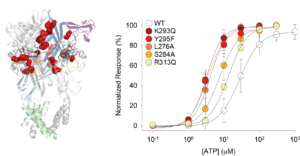 After many delays (mea culpa!), we finally posted our work on P2X2 receptor gating on bioRxiv. Huge thanks to Federica Gasparri, first-ever PhD student of the Pless lab, who was later joined by Sarune Bielickaite and Mette H. Poulsen on the project. We show that mutating the inter-subunit interfaces consistently increases apparent ATP affinity.
After many delays (mea culpa!), we finally posted our work on P2X2 receptor gating on bioRxiv. Huge thanks to Federica Gasparri, first-ever PhD student of the Pless lab, who was later joined by Sarune Bielickaite and Mette H. Poulsen on the project. We show that mutating the inter-subunit interfaces consistently increases apparent ATP affinity.
Welcome back, Hendrik
After doing his thesis work with us and finishing his MSc (equivalent) in Germany, we are delighted to welcome Hendrik Harms back as a PhD student. He will be working on atypical sodium channels and we very much look forward to having him around again!
Intein-mediated engineering of channels
Congrats to Debayan and Hendrik for leading the efforts on this book chapter on split-intein mediated engineering of ion channels. Big thanks also to Iacopo and Zeshan for helping to putt together this chapter, which will hopefully help others to implement this powerful approach. The chapter is online now HERE.
Register for ion channel symposium
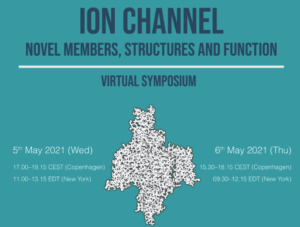 Registration is now open for the first ion channel symposium on ‘Novel members, structures and function’ – sign up for free here. The May 5th and 6th event will be fully online and feature an exciting line up of ion channel experts from around the globe.
Registration is now open for the first ion channel symposium on ‘Novel members, structures and function’ – sign up for free here. The May 5th and 6th event will be fully online and feature an exciting line up of ion channel experts from around the globe.
New preprint on bioRxiv
Congrats to Zeshan for leading this big effort into the contributions of M1 and pre-M1 to ion selectivity in ASICs and ENaCs. The work features plenty of ephys (whole cell, single channel and high throughput), plus >80 conventional mutants, plus non-canonical amino acids and more – and can now be found on bioRxiv. This study would not have been possible without the other contributors and collaborators Matthias Wulf, Timothy Lynagh (now in Bergen, Norway), Mike Althaus (Bonn, Germany) and Søren Friis (Nanion Technologies)
Welcome back, Mette and Katharina
We are delighted to welcome Mette and Katharina back to our team! Mette re-joins after maternity leave to continue her exciting work on protein-protein interactions and Katharina will conduct her MSc thesis work on NALCN – great to have you around (again)!
Welcome on board, Marijana
Today, we say hi to Marijana Oljica, who will be around as a laboratory technician intern for the next year – welcome and we look forward to having you around!
Goodbye Alex
Alex was our latest lab tech intern and we are very grateful for all your help over the last (and slightly chaotic) year. Thanks and all the best for your next move(s).
Farewell Zeshan
We continue our (sad) string of farewells in early 2021 by saying goodbye to Zeshan. He had joined in 2016 as a PhD student and has since greatly helped us understand ion selectivity in ASICs and ENaCs. He has been immensely productive and he will be missed a lot! Thank you for everything and all the best for your next endeavours – we hope to still see you around occasionally!
Nina says goodbye
Today, it was time to bid our (socially distanced) farewell to Nina. We are very sad to see her move on after having been around for the past 6 years – and having been instrumental in setting up much of the ncAA and ASIC efforts around the lab. Thank you so much for all your contributions in and around the lab – you will be missed a lot! Wishing you all the best for your next endeavour!
Congrats to Iacopo and Hendrik
Our latest endeavour into protein semi-synthesis / MD combo is out on bioRxiv. Together with our fantastic collaborators from the Lucie Delemotte lab, we show how Nav1.5 patient mutations can be functionally benign – until they get phosphorylated and then wreak havoc on inactivation. Great job by Iacopo and Hendrik putting this together and we are grateful for support by DFF and the Lundbeck Foundation.
Well done Stephanie!
Congrats to postdoc Stephanie for being awarded an infrastructure grant from the Carlsberg Foundation. The grant will support her efforts into understanding how neuropeptides modulate ASICs – read further details HERE.
Farewell to Christian
After a productive 5 years in the Pless, we are very sad to see Christian move on. He has been instrumental in many of our ASIC-related projects, especially those involving neuropeptides and toxins – and will be missed tremendously by us all! Thanks for being a great lab members and all the best for whatever awaits you on the other side of your 4 month-daycare career!
Ninas new preprint is out
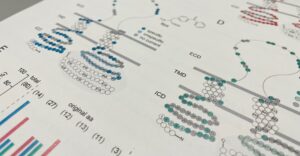 Congrats to Nina for getting her primary PhD project out on bioRxiv! She established a way to record from ncAA-containing ASICs on an automated patch-clamp (APC) device – and used the approach to dig into the details of the function and pharmacology of up to 309 ASIC variants. Huge thanks to our collaborators: Jacob Andersen for getting this off the ground, Søren Friis from Nanion for lending us his APC expertise and the Team of Andrea Sinz in Halle for their help with mass spectrometry!
Congrats to Nina for getting her primary PhD project out on bioRxiv! She established a way to record from ncAA-containing ASICs on an automated patch-clamp (APC) device – and used the approach to dig into the details of the function and pharmacology of up to 309 ASIC variants. Huge thanks to our collaborators: Jacob Andersen for getting this off the ground, Søren Friis from Nanion for lending us his APC expertise and the Team of Andrea Sinz in Halle for their help with mass spectrometry!
More good news
We are immensely grateful for the Novo Nordisk Foundation to support our latest endeavours into the world of atypical sodium channels. We very much look forward to getting this new project off the ground in 2021 – stay tuned!
Chow talks in Canada (virtually)
Chow was invited to present some of our recent data on the function and structure of NALCN at the University of Alberta, Edmonton.
How to neutralize a snake toxin
After years of work, this collaboration on peptide inhibitors of the alpha-cobratoxin-nAChR alpha7 interaction is finally out. Big thanks to everyone involved, especially to Brian Lohse for initiating it all, our lab neighbours Christian Olsen and Bengt Gless for affinity measurements, the Daniel Kümmel group for structural work – and the tireless Tim Lynagh for pretty much everything else! Read the full story in J Med Chem now.
Claudia talks to Nanion
Claudia Weidling got to talk to our collaborators at Nanion Technologies about electrophysiology in general and her recent work on NALCN in particular. Listen to the podcast HERE.
Stephan talks at Columbia
Big thanks to Manu Ben-Johny for putting together a great (virtual) seminar visit at the Department of Physiology and Cellular Biophysics at Columbia. Huge pleasure to meet the amazing faculty and present some of our latest work!
Thanks to Team MSc
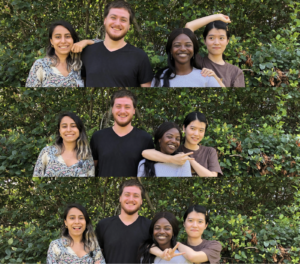 Big thanks to our four MSc students this year: Aisha Ameen, Asli Topaktas, Johann Sigurdsson and Peilin Tu. Well done on finishing your projects and we will you all the best for the future. Special thanks also to their lab supervisors for all their support and dedication in helping these four grow!
Big thanks to our four MSc students this year: Aisha Ameen, Asli Topaktas, Johann Sigurdsson and Peilin Tu. Well done on finishing your projects and we will you all the best for the future. Special thanks also to their lab supervisors for all their support and dedication in helping these four grow!
Congrats to Asli
Congrats to Asli Topaktas for successfully defending her MSc thesis today. She was the fourth and last MSc student to finish this year and she has helped us decipher some of the details of how ASICs are modulated by toxins and neuropeptides – thanks and all the best for the future!
Congratulations Aisha
Well done Aisha Ameen, who successfully defended her MSc thesis today! Aisha helped us decipher the function of a whole range of NALCN patient mutations. We will miss having a native English (British!) speaker around and we’re wishing her all the best for her next endeavours!
Johann defends his MSc thesis
Congrats to MSc student Johann Sigurdsson for successfully defending his thesis yesterday. Big thanks for helping us understand some of the effects of protein-protein interactions on ASICs – and all the best for your future!
Well done, Dr Sheikh
Congrats to Zeshan for successfully defending his PhD thesis today. Over the past 3 years, he made huge contributions to our attempts to decipher ion selectivity in ASICs and ENaCs. He then demonstrated strong nerves when having to write up and defend during a pandemic – well done!
Big thanks also to the assessment committee, consisting of Drs Palmer, Premdjee and Kristensen.
Congrats to Peilin
Congrats to our MSc student Peilin Tu for successfully defending her thesis today. She helped us understand how Nalcn is modulated by auxiliary proteins. Well done and best of luck with your future endeavours!
2020 lab retreat
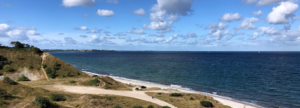
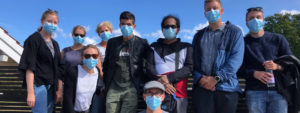

This year, our annual lab retreat took us to Sjællands Odde, where we were hosted in Janne’s beautiful summer house. Big thanks to everyone for contributing to our lively discussions on stress(relief), reproducibility, research integrity and minimizing waste around lab. Fingers crossed we can do our next retreat without face masks.
Welcome to new postdoc Debayan
Debayan Sarkar finally made it to Denmark today after a (multiple month) long delay due to the COVID-19 situation. He joins us from India, where he conducted a very successful PhD working on (mostly) peptide modulation of TRPV1 channels – welcome and we look forward to having you around!
Welcome Katharina
Today, we welcomed Katharina Schott to our team. She joins us from the University of Vienna for a internship this fall, followed by her MSc thesis work in 2021 – we look forward to having her around!
Review in J Physiol
 Our review on chemical biology tools to manipulate ion channels is out in The Journal of Physiology now. Nina and Zeshan put together a nice summary on the most recent advances in Cys conjugation, ligand-directed chemistry, non-canonical amino acids, semi-synthesis and more! Check the review out here.
Our review on chemical biology tools to manipulate ion channels is out in The Journal of Physiology now. Nina and Zeshan put together a nice summary on the most recent advances in Cys conjugation, ligand-directed chemistry, non-canonical amino acids, semi-synthesis and more! Check the review out here.Structure of NALCN out in Nature
Great collaboration with the Ciferri and Payandeh groups out in Nature now: Structure of the human sodium leak channel NALCN/FAM155A complex.
The work explains how a) FAM155A forms a dome-like structure above the pore to determine the notorious NALCN pharmacology, b) structurally unique voltage-sensing domains mediate the odd voltage-sensitivity and c) disease-causing mutations cluster around the pore module to affect channel function.
Congratulations to the teams on both sides! Especially excited for Marc, Chow, Cameron and Claudia, who lead our efforts on structure and function! Big thanks to the amazing (and tireless) Jian, as well as our local undergrad students Aisha and Oskar for their contributions.
My group is hugely grateful to the Carlsberg Foundation, DFF and Lundbeck Foundation for their continued support since the early stages of this exciting project.
Big thanks to external lab meeting speakers
We are very grateful to Anna Ulstein Odland (UCPH, DK), Eva Kaulich (MRC, UK) and Valeria Kalienkova (Univ Groningen, NL) for agreeing speak at our recent virtual lab meetings! Great to hear about their exciting science – and a fantastic opportunity for us to learn more animal models, funky channels and cryo-EM!
Lab is back in action
After over two months of zero, or at least very restricted lab access, we are delighted to report that we are back in action. Distancing and hygiene rules stay in place, but everyone as able to come to the lab again and continue their projects.
Things have been challenging in many ways since the shutdown, but the team did a fantastic effort to make the best of the situation – kudos to everyone’s patience and resilience!
Protein engineering paper out in Nature Communications
Huge congrats to the whole team, lead by the terrific and fearless duo of Keith and Iacopo, for putting together a terrific study on protein engineering! Initially not more than a somewhat abstruse idea, the team managed to insert synthetic peptides into a variety of proteins in life cells using what has become internally known as ‘intein magic’. The work is now published at Nature Communications, including a blog post in the Nature Research Bioengineering Community.
Thanks also to our collaborators from the Tampé group in Frankfurt – and to our funders for enabling us to bring this idea to life.
Our first NALCN paper out in Science Advances
After a big effort from Team NALCN, our first paper on the NALCN complex is now out in Science Advances. We show that NALCN-mediated currents are only observed in the presence of three auxiliary proteins – and that the leak activity is modulated by both extracellular calcium and voltage. Big thanks to Chow, Matthias, Claudia and Lise for all their hard work on this tricky project!
First step back towards normality
After exactly 6 weeks of shut down, we are excited to report the partial re-opening of the lab! For now, it will only be one person at a time, but it is great to know that we are able to get our projects going again. Big thanks to all lab members for their patience – both over the last few weeks and now during this slow re-opening phase.
New ASIC paper out in PNAS
We are delighted to announce the formal publication of our latest paper on ASICs in PNAS. The work, lead by postdocs Christian, Nina and Stephanie, shows how a neuropeptide binds to and modulates ASIC1a. The study involved many different technologies and we are hugely grateful for the contributions by our terrific collaborators in the Bennett and Strømgaard labs at KU! Due to its potential implications in pain, the work was featured in a KU press release and on Eurakalert!
Lab shut down due to COVID-19 crisis
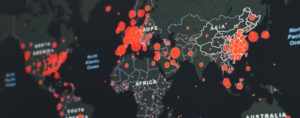 Like most other labs around the globe, we are currently shut down. Nobody is allowed in the lab and all scientific activities are limited to online meetings, reading, writing and project planning tasks. This creates a whole new set of challenges for everyone involved, but the team has been fantastic in keeping up the spirit during this unusual time – huge thanks to everyone for their continued efforts and motivation to restart their projects as soon as we are allowed back to the lab!
Like most other labs around the globe, we are currently shut down. Nobody is allowed in the lab and all scientific activities are limited to online meetings, reading, writing and project planning tasks. This creates a whole new set of challenges for everyone involved, but the team has been fantastic in keeping up the spirit during this unusual time – huge thanks to everyone for their continued efforts and motivation to restart their projects as soon as we are allowed back to the lab!
Farewell Oskar
After half a year in the lab, it’s time for Oskar to move on. He was fortunate enough to be financed by a NNF pre-graduate scholarship and has done a fantastic job working on NALCN – he will be missed!
Pless lab in San Diego
Nina, Chow and Stephan represented the lab at the annual meeting of the Biophysical Society in San Diego. This was a great opportunity to catch up on the latest science and meet old (and new) friends. Nina presented a very well-received ASIC poster, Chow gave a great talk on NALCN and Stephan took home the Paul F Cranefield award by the Society of General Physiologists (SGP), making for a very successful meeting overall!
New paper on bioRxiv
Proud to present our first foray into protein semi-synthesis. Using Nav1.5, P2X2R and GFP as examples, we show that tandem protein trans-splicing can used to insert synthetic peptides into proteins in live cells. The project was lead by two fantastic postdocs, Keith Khoo and Iacopo Galleano, with assistance from a number of other lab members, as well as our collaborators from the Tampé group in Frankfurt. Full paper can be found on bioRxiv.
Farewell Cristina
After providing fantastic help and assistance with many projects in the lab, lab technician intern Cristina is moving on to finish her education. Thank you very much for everything, you did extremely well and we wish you all the best for your future studies!
Welcome Feng Xue
Originally from Chengdu, China, Feng Xue did his MSc at the University of Sydney, Australia. He has a background in ion channels and we look forward to having him join our ASIC team for the next three years – welcome and we look forward to having you around!
Welcome Alexandru
We are delighted to welcome Alexandru Palade to the team as the new laboratory technician intern – we look forward to having him around!
New paper out in JGP
Congrats to lab almuni Tim, current PhD student Zeshan, as well as our collaborators Emelie, Celine and Toby in Melbourne on this work on determinants of ion selectivity ASIC1a- and ASIC2a-containing acid-sensing ion channels – now online at JGP.
Congrats to Stephanie
Congrats to Stephanie for being selected for an oral presentation at the Ligand Recognition and Molecular Gating GRS in Lucca, Italy in March! She will be presenting some of our latest work on neuropeptide regulation of ASICs – some of which can be already previewed on bioRxiv
Here is to 2020!
As the year is drawing to a close, I would like to thank all lab members, our collaborators near and far, as well as our CBP neighbours for all their work, support and inspiration throughout 2019 – this really was an exciting year and we look forward to a fun and successful year 2020!
Congrats to Chow
Congrats to Chow for being selected for a platform talk (and session chair) at the next Biophysical Society Meeting in San Diego, where he will be talking about his latest finding on the sodium leak channel complex. Additionally, he also secured a travel grant to attend the meeting – well done!
Stephan tours the US.
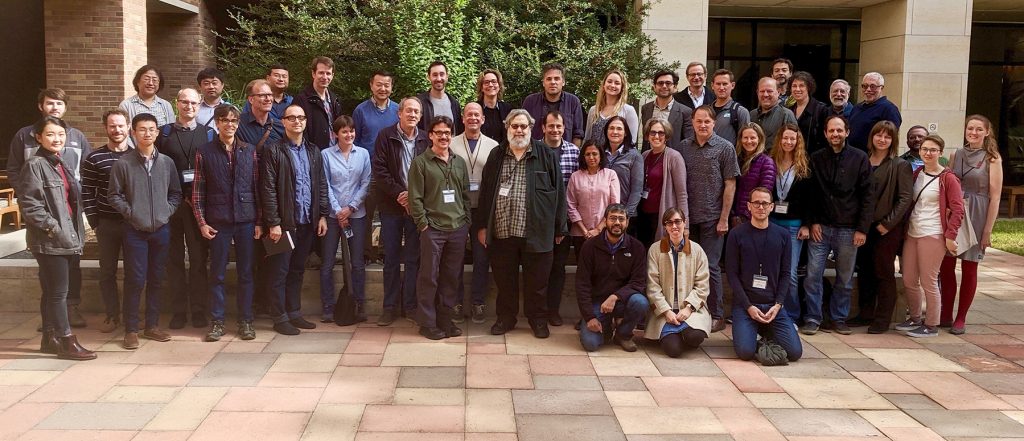
After very exciting visits to Cornell, UPenn and U of T (Houston), Stephan had the honor to be part of the inaugural Austin Conference on Ion Channels (and Transporters), which provided a fantastic update on the latest developments in an exciting field – a huge thank you to all hosts and organisers!
Postdoc position available
We currently have a postdoc position available for a project on split intein-mediated semi-synthesis of ion channel. The ideal candidate has experience in ion channels, molecular/chemical biology, protein engineering and electrophysiology. Email your motivation letter, along with CV (incl contact info for 3 referees) and publication list to contact@theplesslab.com
Farewell to Matthias
A lab member since 2015, Matthias has been instrumental in many projects in the lab and will be sorely missed. In particular, and thanks to his admirable patience, perseverance and technical ability, he helped establish a number of different (and difficult) approaches in the lab. We are very grateful for his many contributions and wish him all the best for his next career stage and beyond.
New manuscript on bioRxiv
Check out our latest manuscript on bioRxiv, in which we outline how and where the neuropetide big dynorphin exerts its effects on ASIC1a. For this project, we have employed the widest array of approaches to date, including electrophysiology, voltage-clamp fluorometry, peptide synthesis, CRISPR and non-canonical amino acids cross linkers. Congratulations to our former PhD students (now postdocs) Christian and Nina and the rest of the team that contributed to this grand effort – in particular to our collaborators from the Bennett and Strømgaard groups.
New grant to support our work on ASICs
We are very grateful to the Lundbeck Foundation for an Ascending Investigator grant that will support our work on ASICs for the next four years. We are excited to get this project started!
Congrats to Sarune
Congratulations to Sarune for successfully defending her MSc thesis today. Over the past 12 months, Sarune did a great job advancing some of our work on P2X2 receptors, as well as some intein-based protein engineering. Well done and all the best for your future – you will be missed!
Our new ASIC paper is out
In a collaborative effort with our colleagues at Temple University, Philadelphia, US, we have looked at evolutionary conserved interactions within the pore domain of ASICs. While Marina Kasimova, Daniele Granata and Enzo Carnevale covered the computational work in Philadelphia, Timothy Lynagh (now in Bergen), Zeshan Sheikh and Christian Borg handled the experimental part in Copenhagen. The work is now online at Biophysical Journal – congrats to everyone involved!
Welcome to our new lab members
As we say goodbye to last years MSc students, we say hi to our new lab members: MSc students Aisha Ameen, Asli Topaktas, Johann Sigurdsson and Peilin Tu, as well as scholar student Oskar Bahlke. Welcome and we look forward to having you around!
DHL run 2019
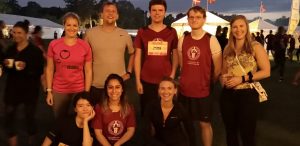 Along with the rest of the Center for Biopharmaceuticals, members of the Pless lab took part in the annual DHL relay – well everyone for surviving a busy 5 (or 10, for some) kilometers through the busy, smoke-filled running maze through Fælledparken.
Along with the rest of the Center for Biopharmaceuticals, members of the Pless lab took part in the annual DHL relay – well everyone for surviving a busy 5 (or 10, for some) kilometers through the busy, smoke-filled running maze through Fælledparken.
Congrats to Jamie
Congrats to Jamie for successfully defending his MSc thesis. Jamie spent a year with us working on a tricky receptor, together with his supervisor Mette. Big thanks to both for making a lot of headway on an exciting project and we wish Jamie all the best for the future.
Our work on NALCN is on bioRxiv
Huge thanks to postdoc Chow and the rest of the NALCN team for their epic efforts to put this manuscript together. We demonstrate how the elusive sodium leak channel requires the presence of three other neuronal proteins to be robustly expressed in heterologous systems. We then go on to show that its constitutive activity is modulated by both voltage and extracellular divalent cations, in particular calcium. All the details to be found on here. We are very grateful for the support from the Danish Research Council, the Carlsberg Foundation and the Lundbeck Foundation.
Congrats to Yasmin
After over a year in the lab, it was Yasmin´s turn to defend her MSc thesis. She had been working hard to support our efforts to delineate the binding site of a neuropeptide on ASIC1a and did very well defending her thesis work. Yasmin has been an absolute pleasure to have around and we will miss her going forward!
Congrats to Zeshan
Well done, Zeshan, for securing a grant from the Augustinus Foundation! The funding will support his 3-month stay abroad at the University of Newcastle, UK.
Well done, Stephanie
We are very grateful to the Hartmann Foundation for having granted Stephanie’s running cost grant application to support her work on neuropeptide binding to acid-sensing ion channels.
Nina successfully defends PhD
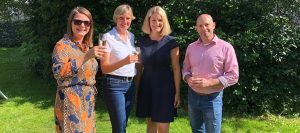 Congratulations to Nina for successfully defending her PhD after a an impressive 3-year methodological tour-de-force, which established a powerful new technology in our lab. We are excited to have you stay around at least for a little while longer and put all that experimental magic into action!
Congratulations to Nina for successfully defending her PhD after a an impressive 3-year methodological tour-de-force, which established a powerful new technology in our lab. We are excited to have you stay around at least for a little while longer and put all that experimental magic into action!
Farewell Keith and Iacopo
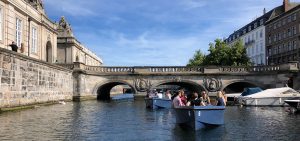
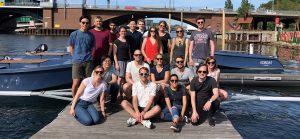 A sad (but sunny) day for the lab, as we had to bid farewell to postdocs Keith and Iacopo, who have been working hard on our latest efforts in using split inteins to engineer proteins. The two have made a fantastic (and highly complementary) effort to get this work off the ground and they will be missed sorely in the future. We wish them all the best for their next endeavours!
A sad (but sunny) day for the lab, as we had to bid farewell to postdocs Keith and Iacopo, who have been working hard on our latest efforts in using split inteins to engineer proteins. The two have made a fantastic (and highly complementary) effort to get this work off the ground and they will be missed sorely in the future. We wish them all the best for their next endeavours!
Iacopo and Stephan in Berlin
Along with parts of the Strømgaard and Olsen groups, Iacopo and Stephan got a chance to attend the 2019 Chemical Protein Synthesis Meeting in Berlin – and marvel at the outstanding lineup of speakers. Thanks to the organisers for a fantastic meeting on the latest and greatest in protein synthesis.
New grant
We are very grateful to the Independent Research Fun Denmark for a 3-year grant to expand on our work on split inteins in ion channels.
Farewell Lise
As of today, Lise will be moving on from the lab. We enjoyed having her around for the last year and a half and we wish her all the best for her future endeavours.
Christian defends PhD
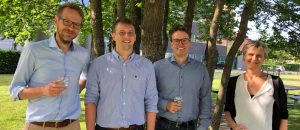 Congrats to Christian Borg for successfully defending his PhD today! He did a fantastic job over the last three years working on peptide modulation of acid-sensing ion channels and also established a number of techniques along the way. A big thanks also to the assessment committee, composed of Profs Frølund, Gründer and Grunnet. Congrats again and we are very glad that we will have him around for a bit longer!
Congrats to Christian Borg for successfully defending his PhD today! He did a fantastic job over the last three years working on peptide modulation of acid-sensing ion channels and also established a number of techniques along the way. A big thanks also to the assessment committee, composed of Profs Frølund, Gründer and Grunnet. Congrats again and we are very glad that we will have him around for a bit longer!
New paper out
Congratulations to Federica for having her first paper from her PhD published in JGP today. She used protein backbone mutagenesis in combination with a wide range of ATP/CTP analogs to show how P2X receptors recognise and discriminate between different agonists. You can read the whole story on the JGP website.
Nina wins poster prize
Congrats to Nina for winning the poster prize at the 2019 edition of the Ion channel symposium in Copenhagen – well done!
Jacques Monod meeting in Roscoff
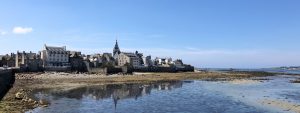
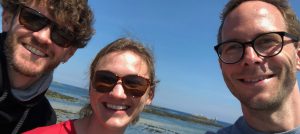
Stephanie and Stephan were lucky enough to be able to attend the fantastic Jacques Monod meeting on ligand-gated ion channels in Roscoff, France – where they also ran into Pless lab alumni Timothy Lynagh (now in Bergen, Norway). Apart from an outstanding program (details to be found HERE), the meeting featured a spectacular setting, along with great weather and food – and big thank you goes to the organisers and we have our fingers crossed for more meetings in Roscoff in the future.
Christian talks at Ion Channel Symposium
Congrats to Christian for being selected as a speaker at the 2019 Ion Channel Symposium in Copenhagen. He will be talking about the latest data on the interaction between ASICs and an endogenous neuropeptides, generated by him, Nina and Yasmin. The full program of the meeting can be found here.
Congrats to Stephanie
Thanks to generous support through postdoc fellowships from the Marie Curie program and the Lundbeck Foundation, Stephanie will be able to work on an exciting new project in our lab for the next 3 years – looking forward to getting this off the ground!
Congrats to Iacopo
Congrats to our resident Italian chemist for securing a coveted postdoc fellowship from the Lundbeck Foundation. He will join the lab of Prof Huib Ovaa in Leiden to conduct a collaborative project for the next 3 years. We are sad to see him move to the Netherlands after the summer, but it will be great to collaborate with him on this project in the future!
Biophysics 2019
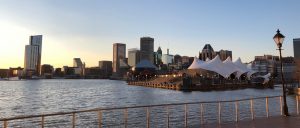
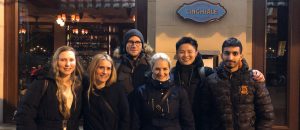 Thanks to the generous support of the Oticon Foundation, Pharma Denmark and the Boehringer Ingelheim Fond, we were able to attend the 2019 edition of the Biophysical Society meeting in Baltimore with Lise, Mette, Nina, Chow, Zeshan and Stephan. The poster presentations were very well received and Nina did a great job presenting her PhD work in a platform talk – congrats and well to everyone involved.
Thanks to the generous support of the Oticon Foundation, Pharma Denmark and the Boehringer Ingelheim Fond, we were able to attend the 2019 edition of the Biophysical Society meeting in Baltimore with Lise, Mette, Nina, Chow, Zeshan and Stephan. The poster presentations were very well received and Nina did a great job presenting her PhD work in a platform talk – congrats and well to everyone involved.
Welcome Cristina
We are delighted to welcome Cristina Bulancea to the team as our next laboratory technician intern. Originally from Moldova, she will join our lab as part of her education as a laboratory technician in Aarhus – we look forward to having you around!
Farewell Cristiana
We have been very fortunate to have had Cristiana Chirvas around for the past year as a laboratory technician intern. She has done a fantastic job in the lab and has been great to be around – we will miss you and wish you all the best for the next career step!
Matthias is back, at least for a while
After just having said farewell to Matthias a short while ago, he is back in the lab for a short-term, part-time position to help us out with a bunch of urgent patch-clamp experiments -good to have you around again (if only for a short while)!
Congrats to Tim
Very proud to announce that today marks the first day of Pless lab alumni Timothy Lynagh as group leader at the Sars International Centre for Marine Molecular Biology in Bergen, Norway – congrats again and all the best for putting your ERC Starting Grant to work! Tim was the first-ever postdoc to join the Pless lab and made a huge contribution from day one – he will be missed.
Happy New Year
We´re wishing all lab members (past and present), collaborators, friends and family a happy new year and a great start into 2019! No doubt the new year will bring many more exciting results, projects and fun events – can´t wait to get going with all of it 🙂
Farewell and thanks to Matthias
Today, we said goodbye to former PhD student and postdoc Matthias. Being only the second-ever PhD student in the Pless lab, he was there from pretty much the beginning and has made a huge contribution to setting up methods and making the lab the place it is today. Not only has he (single-handedly) established high-sensitivity patch-clamp fluorometry, but he has also worked with single channel recordings, FRET, unroofing of mammalian cells etc – and always been a role model in persistence and patience. He will be missed dearly and we wish him all the best for his next move!
Iacopo and Stephan in Kyoto
Iacopo and Stephan were fortunate to enough to be able to attend the 10th International Peptide Symposium in Kyoto, Japan. The meeting featured a very strong line-up of peptide experts from around the globe and gave us the opportunity to present our work on split intein-mediated semi-synthesis of ion channels – and get a taste of Japanese culture (and food!). Thanks to the organisers for a fantastic meeting.
Stephan talks in Osaka
Thanks to the kind invitation by Prof Yasushi Okamura from the University of Osaka, Japan, Stephan had a chance to brush up on the latest developments with regards to a number of ion channel-related topics. A big thank you to Prof Okamura for hosting such a great visit in Osaka!
Interested in doing a MSc with us?
We are looking for highly motivated MSc students that would like to spend 9-12 months in an our lab in 2019/2020.
We offer exciting projects and an ambitious environment that is populated by a friendly and international team.
We currently have two projects available:
# 1: Finding a cure for the incurable: Identify the first ever inhibitor of a newly discovered membrane protein required for life in mammals.
#2: Targeting pain & stroke: Define how neuropeptides and animal-derived venom peptides interact with an ion channel to target pain and stroke.
For more information please contact Stephan.pless@sund.ku.dk
Finally on Twitter
Yup, it took us a while, but you now finally find us on Twitter: @LabPless
Stephan talks in Vienna
Stephan was lucky enough to be invited to give a talk at the Institute for Pharmacology at the Medical University Vienna. This entailed catching up with the resident transporter and ion channel experts, as well as reconnecting with old friends – thanks to Sonja Sucic for organising a terrific visit!
Welcome Stephanie
This week, we welcomed Stephanie Heusser, who joins us for a postdoc after a very successful PhD with Erik Lindahl in Stockholm. An expert in ion channel function and pharmacology, she will be working on a new fluorescence-based assay – welcome to the team!
Stephan talks in Italy
Stephan had the pleasure of being invited to a meeting on “Ion channel design using experimental and computational inputs” in beautiful Gargnano on the shores of Lake Garda, Italy. The 3-day event covered a broad range of topics and provided fascinating insight into the latest developments in the field – find the full program here.
Welcome Sarune and Jamie
We are very happy to announce that Sarune and Jamie will be joining our team for a 1-year MSc thesis – welcome and we look forward to having you around!
2 new publications in JGP
We are very grateful to have been part of a fun collaboration with the Kurata lab at the University of Alberta, Edmonton, Calgary on the mechanism of two related potassium channel openers. In two back-to-back manuscripts in JGP we describe how these compounds (one of them in use as an anti-epileptic) require very different drug-channel stoichiometries to affect channel function: despite their resemblance, one of the requires only a single drug binding site per channel tetramer, while the other requires drug binding sites on each of the four channel subunits to have its full effect. Here are the links to the retigabine story and the ICA study.
Big funding success for Tim
Congratulations to Tim for securing a coveted ERC starting grant! We wish him all the best for starting his own group later in the year and have no doubt he will put the grant to good use over the next 5 years. Find the link to the KU SUND news feature here
Trip to the sunny south
We were lucky enough to be able to spend the 2018 edition of our annual lab retreat at Lake Como, Italy. Although our lodgings were not quite as fancy as George Clooney´s famous lakeside estate only meters further down the road, we greatly enjoyed our two days of science presentations and hikes. Thanks to the advice and planning by local and former PhD student Federica, we were treated to great food and superb views – while also brushing up on a lot of the technologies used in the lab (e.g. obsessing over Western blots, series resistance compensation and color palettes). Thanks everyone for making it a productive and fun outing!
Well done, Zeshan
Following in the footsteps of his PhD student predecessors, Zeshan delivered an award-winning presentation at the annual DRA Research Day – congrats on the poster prize!
New paper online
Together with the Strømgaard and Jemth groups, we have just published a review on probing backbone hydrogen bonds with amide-to-ester substitutions. So, if you always wanted to know how to dissect the contributions of backbone hydrogen bonds, you can check out a compilation of the latest attempts in the field HERE.
Welcome Claudia
Today, we welcome Claudia Weidling as our latest PhD student. Originally from Hamburg, she has ample experience in protein biology and will join Chow and Lise on a new project in the lab. Welcome and we look forward to having you around!
Congrats to Tim
Together with our collaborators from the Glover group in Norway, Tim has worked hard to shed new light on the emergence of proton sensing – which, as it turns out, has happened a lot longer ago than previously anticipated. He also spent significant efforts on elucidating the mechanism of proton sensing itself, a topic that continues to puzzle the field. The work has been accepted at PNAS, where it can currently be found in the “Latest Articles” section – follow the link HERE.
A huge thanks to Tim!
After 4 1/2 very successful years in the Pless lab, Tim moves on to establish his own group later in the year. Tim was the first group member of the Pless lab and has been instrumental in setting up the lab and getting various projects off the ground – and looking at his track record, he has done so in a very successful fashion: he has published high-impact papers (his latest one can be found HERE), acquired highly competitive postdoc-fellowships and also established himself as a recognised expert amongst ion channelologists, as evidenced by his latest assignment as chair of the Ion Channel GRS in the US!
We wish Tim all the best for the adventures ahead and hope to still get to see him every once in a while – he will be missed!
Gordon Conference on Ion Channels 2018
Every two years, ion channel geeks from around the globe gather in the middle of nowhere (South Hadley, to be precise) to attend the Gordon Conference on Ion Channels. The Pless lab made a good showing this year, with 4 posters, a talk by Keith and Tim chairing the research seminar preceding the main meeting. It was a great conferecence with plenty of opportunities to catch up with friends and colleagues from the field – and of course with former PhD student Federica.
Camilla defends her MSc thesis
Congrats to Camilla for successfully defending her MSc thesis today! She rewarded herself for over a year of hard work using voltage-clamp fluorometry to decipher pharmacological aspects of acid-sensing ion channels. Thanks for all your contributions and all the best for your PhD – you will be missed around here!
We are looking for a PhD student
We are looking for a highly motivated PhD student to join our team from August 2018. If you have a strong background in ion channels or genetics (especially practical exerience in electrophysiology and/or phylogenetic analysis), please check out the job posting. Please note that applications have to be submitted through the online application form. Direct applications will not be considered.
Congrats to Matthias
Congrats to Matthias for successfully defending his PhD thesis! After three years of hard work on establishing and using a new fluorescence-based approach to study ion channel conformational changes, Matthias obtained his PhD today. Thanks also to his assessment committee: Drs Giraldez (Spain), Poulsen (Aarhus) and Løland (KU).
Congrats to Chow
Congrats to Chow for having a project published together with our collaborators Drs. Helge Servatius and Argelia Medeiros-Domingo (Bern, Switzerland ). The work identified a KCNQ1 mutant in an unexplained cardiac arrest victim to be likely non-pathogenic. Find out more HERE.
New commentary
Keith and Stephan just had a commentary published in the Journal of General Physiology on an impressive piece of work by the Zagotta group, which detailed how an intrinsic ligand can fine-tune the activity of a voltage-gated potassium channel. You can find the full story here.
Biophysical Society Meeting 2018
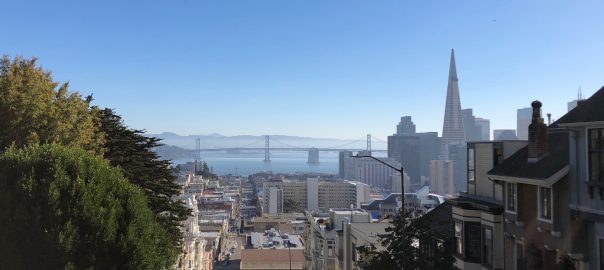
Camilla, Chow, Christian, Tim, Zeshan and Stephan took to sunny San Franscisco to attend the 2018 edition of the Biophysical Society Meeting. Things really kicked into gear on Sun, when both the talk by Zeshan and the posters by Camilla, Christian and Tim were very well received. Already looking forward to the 2019 meeting in Baltimore!
Stephan joins JGP editorial advisory board
Stephan had the honour of being inaugurated as one of the new JGP editorial advisory board members today at the annual JGP editorial board meeting at the Biophysical Society meeting.
Recent PCF paper featured
Our recent PCF paper in Cell Reports is featured in a nice CellPress blog post, including some behind-the-scenes info. Read the details HERE.
Paper on HCN4 patient mutations
A big thank you to our clinical collaborators in Bern (Switzerland) and the HCN4 experts around Anna Moroni in Milan (Italy) for making us part of this nice case study illustrating the “Phenotypic spectrum of HCN4 mutations”, published in Circulation: Genomic and Precision Medicine – follow this LINK for more info.
Congrats to Tim and Daniel
A mere 24hrs after Matthias´ paper, the work by Tim and Daniel appears online at Biochemistry. The story deals with the details of agonist recognition in a flatworm glutamate-gated chloride channel – check out the details HERE.
PCF paper in Cell Reports
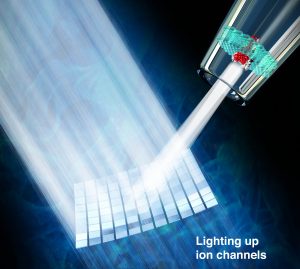 Congrats to Matthias for having his paper on Patch-Clamp Fluorometry published in Cell Reports today! He worked very hard to create a new way to study ion channel motions with increased sensitivity – check out the paper HERE.
Congrats to Matthias for having his paper on Patch-Clamp Fluorometry published in Cell Reports today! He worked very hard to create a new way to study ion channel motions with increased sensitivity – check out the paper HERE.
Welcome Christiana and Yasmin
Today marks the first day of both Christiana and Yasmin in the lab. They will work with us until 2019 as laboratory technician intern and MSc student, respectively. Welcome and we look forward to having you around!
Farewell Natasha
A big Thank You to Natasha after doing a great job helping us out for the past year as part of her laboratory technician intern training – it was great to have you around and you will be missed! We wish her all the best for her future endeavours and have our fingers crossed that this will include a stay in Scotland 🙂
Center for Biopharmaceuticals retreat
This year, inspired by a fantastic line-up of speakers, we spent 2 days talking about various aspects of ‘Innovation’ – and finally made it to Kronborg Slot to check out the old royal digs.
New review out
Thanks to a very fruitful joint effort with Prof Lucia Sivilotti at UCL, London, our latest review on pentameric ligand-gated ion channels (aka Cys-loop receptors) is out now. It provides an update on how these membrane proteins interact with ligands, ranging from small molecule agonists, to peptide toxins and accessory subunits. Check out the details HERE.
Welcome Iacopo
After a very successful PhD with our neighbour, Prof Christian Olsen, Iacopo joins us for a postdoc from January 2018. Originally from Italy, the protein and peptide wizzard studied in Sweden before completing his PhD in Copenhagen. Welcome and we look forward to having you around!
New title for Tim
As Tim goes into his final months in our group, he is promoted to Assistant Professor level – congrats and all the best for remainder of your time in the Pless lab!
Happy new year
As 2017 is drawing to a close, I would like to thank all lab members for their hard work and for making work in the lab a fun experience. For 2018, we´re looking forward to another fun and productive year – with a number of manuscripts well under way and some exciting new stories in the lab coming along nicely, 2018 should be a good year for the lab.
Congrats and farewell to Camilla
Camilla continues her streak of successful grant applications to support her stay abroad in Edmonton, Canada with Prof Harley Kurata. Congrats – and we will miss you!
Tim talks in Sydney
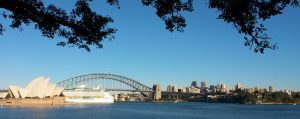 Congrats to Tim for being invited to give a talk at the Australasian Neuroscience Society meeting in Sydney, Australia, where he will be talking about his work on ASICs. Check out the full meeting program here.
Congrats to Tim for being invited to give a talk at the Australasian Neuroscience Society meeting in Sydney, Australia, where he will be talking about his work on ASICs. Check out the full meeting program here.
Federica leaves
As Federica, the first ever PhD student from the Pless lab, is off to her postdoc in Milan in Anna Moroni´s group, we would like to wish her all the very best for her future. She did a fantastic job and not only produced some great science, but also made a significant contribution to setting up the lab just over three years ago! Thanks for all your hard work, we will miss you!
Funding news
We´re delighted to announce that Stephan is among the lucky repicients of a Sapere Aude Starting Grant from the Danish Research Council. The grant will be used to start an exciting new project in 2018 – looking forward to getting this off the ground! See here for the official DFF announcement and here for a local news article.
Congrats to Federica!
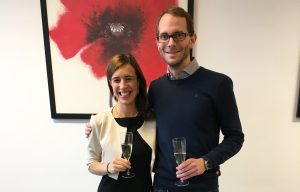 Huge congratulations to Federica for successfully defending her PhD thesis today! Having been around from the very beginning, she´s the first ever PhD student to graduate from the Pless lab and will be missed a lot. We wish her all the best for her postdoc endeavours in Milan!
Huge congratulations to Federica for successfully defending her PhD thesis today! Having been around from the very beginning, she´s the first ever PhD student to graduate from the Pless lab and will be missed a lot. We wish her all the best for her postdoc endeavours in Milan!
Novo Nordisk Symposium
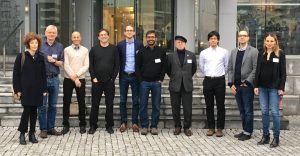 After hosting a successful inaugural symposium in 2016, Hanne Poulsen (Aarhus) and Stephan had been lucky enough to receive a Novo Nordisk Symposium grant to host a number of world-class speakers on the topic of “Studying and controlling membrane proteins with light”: Anna Moroni (Milan, Italy), Peter Hegemann (Berlin, Germany), Ofer Yizhar (Weizmann, Israel), Ehud Isacoff (Berkeley, USA), Baron Chanda (Wisconsin, USA), Antoine Triller (Paris, France), Yuki Bando (Columbia, USA) and Justin Taraska (NIH, USA). We are very grateful to NNF, the speakers and all attendees for making it a great day – and hope to organise a follow up in 2018!
After hosting a successful inaugural symposium in 2016, Hanne Poulsen (Aarhus) and Stephan had been lucky enough to receive a Novo Nordisk Symposium grant to host a number of world-class speakers on the topic of “Studying and controlling membrane proteins with light”: Anna Moroni (Milan, Italy), Peter Hegemann (Berlin, Germany), Ofer Yizhar (Weizmann, Israel), Ehud Isacoff (Berkeley, USA), Baron Chanda (Wisconsin, USA), Antoine Triller (Paris, France), Yuki Bando (Columbia, USA) and Justin Taraska (NIH, USA). We are very grateful to NNF, the speakers and all attendees for making it a great day – and hope to organise a follow up in 2018!
Welcome Lise
We´re very happy to welcome Lise to the team. Originally from Randers, Denmark, she is an expert in membrane proteins and will join us as a PhD student from December on an exciting new project.
Funding news
We are very grateful to the Lundbeck Foundation for a running cost grant for a new project in the lab – we are looking forward to putting the grant to good use
Welcome back, Mette
We are delighted to announce the return of Mette after her maternity leave – welcome back!
New paper in PNAS
Thanks to the heroic efforts of Drs Kim & Kurata in Edmonton, this nice piece of work illustrates how the voltage-sensing apparatus of neuronal potassium channels is affected by an anti-epileptic drug and the membrane lipid PIP2. Click this LINK for details.
New paper out
Congrats to Tim, Jose and Camilla for getting their work on ibuprofen and ASICs published in J Med Chem. They investigated the ibuprofen/ASIC interaction by deciphering the mechanism of inhibition, identifying the ibuprofen binding site and using a series of ibuprofen analogs to performing structure-activity-relationships. The KU press release can be found HERE, whereas the full paper can be accessed HERE.
We´re looking for a postdoc
We are looking to fill a 1-year postdoctoral position in peptide chemistry from 1.1.2018. The project will focus on using solid-phase peptide synthesis (SPPS) and native chemical ligation (NCL) for protein engineering of membrane proteins. Please apply useing the following LINK (note that direct applications via email CAN NOT be accepted).
Welcome Daniel
Daniel joins us from Germany for an internship until March 2018 to work on peptides interacting with ASICs – welcome and we look forward to having you around!
Congrats to Christian and Matthias
Congrats to both Matthias and Christian for taking first place in the talk and poster competitions at the DRA summer school – very well done, gentlemen!
Benzon Symposium 2017
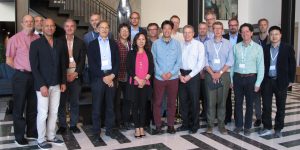
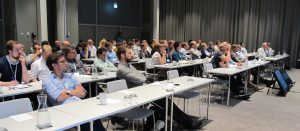 Benzon Symposium “New Paradigms of Protein Engineering – Applications in Modern Medicine”: a fantastic line up of speakers made for an exiting week with plenty of highlights, covering various aspects of chemical biology around proteins and peptides. A big thank you to all speakers and attendees for making it a great symposium!
Benzon Symposium “New Paradigms of Protein Engineering – Applications in Modern Medicine”: a fantastic line up of speakers made for an exiting week with plenty of highlights, covering various aspects of chemical biology around proteins and peptides. A big thank you to all speakers and attendees for making it a great symposium!
Novo Nordisk Symposium on Nov 16th
The program covers various topics related to how membrane proteins can be studied and controlled using light, from single molecule techniques to systems and optogenetics approaches. We have been able to attract top speakers from around the globe, incl Y. Bando (Columbia University), B. Chanda (University of Wisconsin), A. Cohen (Harvard), P. Hegemann (Berlin), E. Isacoff (Berkeley), A. Moroni (Milan), J. Taraska (NIH) and A. Triller (Paris). Attendance is free of charge, but registration is required by Nov 5th. Please use this LINK to register.
Congrats to Federica and Daniel
Congrats to both Federica and Daniel for successfully submitting a PhD thesis (Federica) and defending a MSc thesis (Daniel).
Federica deserves a lot of credit for being the first PhD student from the Pless lab to submit a thesis, in which she not only served as teh guiney pig on numerous occasions, but also made great progress towards our understanding of how ATP binds to P2X receptors. After a well-deserved break, Federica will re-join us for a 3-month stay in the fall.
Daniel made some nice progress on the details of ligand binding to a worm GluCl and we wish him all the best for his future – it was great having you around!
Farewell to Caroline
After a very productive and successful Erasmus internship with us, Caroline is heading back to Germany to start her MSc thesis in Halle. Thanks for your hard work and all the best!
Congrats to Camilla
Congrats to Camilla for securing a Mobility Scholarship. The money will support her stay abroad at the University of Alberta (Edmonton, Canada), where she will work with Prof. Harley Kurata in early 2018.
JBC article highlighted
Congrats to Tim (and Vitaly) for having their recent JBC article highlighted in a special (virtual) issue: http://www.jbc.org/site/vi/ionchannels/
Congrats and farewell to Sarah
Congrats to Sarah for successfully defending her MSc thesis today. Sarah implemented an assay to optically follow incorporation of unnatural amino acids in mammalian cells, which will no doubt come in very handy in the future. We wish Sarah all the best for her future.
Breaking down the nerdy stuff
In case the full version is too nerdy for your taste, you can access a more digestible version of Tim´s paper here – LINK.
Tim´s paper accepted in eLife
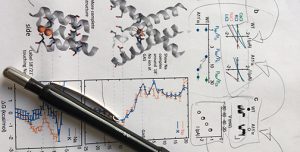 Congrats to Tim, our collaborators in Melbourne (Toby, Emelie and Celine), as well as everyone else involved at our end (Matthias, Vitaly and Janne) for finishing this study! Using a variety of approaches, we believe we have found the selectivity filter of acid-sensing ion channels – check out the details here.
Congrats to Tim, our collaborators in Melbourne (Toby, Emelie and Celine), as well as everyone else involved at our end (Matthias, Vitaly and Janne) for finishing this study! Using a variety of approaches, we believe we have found the selectivity filter of acid-sensing ion channels – check out the details here.
Welcome Zeshan
Today, we welcome our latest PhD student, Zeshan Sheikh – a local with extensive expertise in membrane protein biochemistry. Looking forward to having you on the team!
Facebook feature
Check out the Facebook page of Lundbeckfonden to see a video featuring Christian´s project on spider toxins and ASIC channels.
Open PhD position
We are starting to work on a new, exciting protein and are looking for a highly-motivated PhD student to join our team from October: http://employment.ku.dk/phd/?show=901427
Congrats to Nina
Nina receives a travel grant from the Physiological Society to attend the FEBS/EMBO lecture course on “Ion Channels and Transporters” in Erice – congrats and enjoy Italy!
Congrats to Christian!
Congrats to Christian for securing a travel grant from the Lundbeck Foundation to attend the Biophysical Society meeting in New Orleans – well done!
Welcome Caroline
Coming from Halle, Germany, Caroline will join us as an Erasmus student over the summer. Welcome and we´re looking forward to having you around.
Tim talks
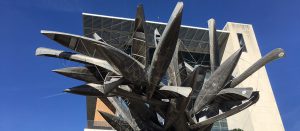 After Tim and Stephan already visited Boston and Austin (where they came across some flying canoes…), they met up with Federica, Christian and Matthias to attend the 2017 Biophysics meeting in New Orleans. Congrats to Tim for being selected to give a talk at the meeting on his latest work on ASICs! Well done also by Federica, Christian and Matthias for attracting lots of attention with their posters.
After Tim and Stephan already visited Boston and Austin (where they came across some flying canoes…), they met up with Federica, Christian and Matthias to attend the 2017 Biophysics meeting in New Orleans. Congrats to Tim for being selected to give a talk at the meeting on his latest work on ASICs! Well done also by Federica, Christian and Matthias for attracting lots of attention with their posters.
Congrats to Federica
Federica continues her successful streak at applying for travel support, this time in form of a travel grant from Oticon to attend the Biophysics meeting in New Orleans – congrats!
Hi and goodbye
While we´re sad to say goodbye to Britt, our first lab technician intern ever, we´re very excited to welcome her successor, Natasha, to the team – glad to have you around!
We wish Britt all the best for her future and will certainly miss her smile (and help!) around here.
Center for Biopharmaceuticals annual retreat
 As is now tradition within the Center for Biopharmaceuticals, the whole crew took to Snekkersten in January – this time with a record-breaking 43 participants. Entertained by excellent speakers, we learned a lot about “Publishing and outreach”, this years topic for the retreat. Thanks to everyone for making this a memorable outing – in particular to Ulla for taking care of a very smooth organisation.
As is now tradition within the Center for Biopharmaceuticals, the whole crew took to Snekkersten in January – this time with a record-breaking 43 participants. Entertained by excellent speakers, we learned a lot about “Publishing and outreach”, this years topic for the retreat. Thanks to everyone for making this a memorable outing – in particular to Ulla for taking care of a very smooth organisation.
New paper in JBC
Tim and Vitaly got the lab off to a flying start in 2017 – congrats for having their paper entitled “Unique contributions of an arginine side chain to ligand recognition in a glutamate-gated chloride channel” accpeted at the Journal of Biological Chemistry! A nice example of how unnatural amino acids can be used to introduce a titratable arginine analog into an ion channel – and uncovering a surprising side chain contribution to ligand recognition. A free PDF of the article can be found by clicking this LINK.
Open PhD position
If you have a MSc degree and practical experience in the use of electrophysiology, unnatural amino acids and molecular biology, please follow this LINK to submit your application. Please note that direct applications via email can not be considered.
Fluorescence Symposium
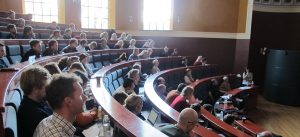 We were fortunate enough to attract an amazing line up of speakers for a symposium focused on fluorescence-based approaches to study membrane proteins. Together with Hanne Poulsen (Aarhus), this meant bringing Teresa Giraldez (La Laguna, Spain), Chris Ahern (Iowa, US), Pancho Bezanilla (Chicago, US), Kevin Eggan (Harvard, US), Poul Nissen (Aarhus), Dimitrios Stamou (KU), Dirk Trauner (Munich, Germany) and Bill Zagotta (Washington, US) to Copenhagen. A huge thank you to our sponsors for financial suport, Ulla Jakobsen for invaluable help with the organisation and all speakers for making this a great day! Keep your eyes peeled for the 2017 edition of this event, which will feature a number of world-class speakers as part of a Novo Nordisk Foundation Symposium on Nov 16th 2017- details to follow in the spring.
We were fortunate enough to attract an amazing line up of speakers for a symposium focused on fluorescence-based approaches to study membrane proteins. Together with Hanne Poulsen (Aarhus), this meant bringing Teresa Giraldez (La Laguna, Spain), Chris Ahern (Iowa, US), Pancho Bezanilla (Chicago, US), Kevin Eggan (Harvard, US), Poul Nissen (Aarhus), Dimitrios Stamou (KU), Dirk Trauner (Munich, Germany) and Bill Zagotta (Washington, US) to Copenhagen. A huge thank you to our sponsors for financial suport, Ulla Jakobsen for invaluable help with the organisation and all speakers for making this a great day! Keep your eyes peeled for the 2017 edition of this event, which will feature a number of world-class speakers as part of a Novo Nordisk Foundation Symposium on Nov 16th 2017- details to follow in the spring.
Success at Carlsberg
Stephan was fortunate enough to be awarded a Carlsberg Foundation ‘Distinguished Associate Professor Fellowship’, which we will put to good use on a new project over the next three years!
Congrats to Nina. Again.
Competing with other PhD students from all over Europe, Nina was able to secure a coveted Boehringer Ingelheim Fond PhD fellowship – congrats and well done, Nina!
Noise
 You would think that 2 years after moving in we would be past any issues related to noise. Well, think again. Thanks to a (not so) brilliantly timed and communicated renovation effort half the department will need to come to work with heavy-duty ear mufflers until the end of the year – or just stay at home. Then again, at least we´ll be well prepared to deal with the inevitable Christmas jingle onslaught.
You would think that 2 years after moving in we would be past any issues related to noise. Well, think again. Thanks to a (not so) brilliantly timed and communicated renovation effort half the department will need to come to work with heavy-duty ear mufflers until the end of the year – or just stay at home. Then again, at least we´ll be well prepared to deal with the inevitable Christmas jingle onslaught.
Congrats to Nina
We´re very happy to report that Nina just received a PhD scholarship from the Lundbeck Foundation!
Welcome Camilla, Daniel and Sarah
After some of them had already joined us on our lab retreat, we´re very happy to have three new MSc students join the team: Camilla Lund, Daniel Vasquez and Sarah Yandurah – looking forward to having you guys around!
Lab retreat 2016
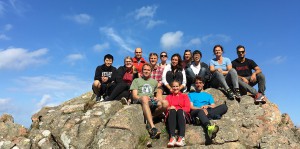 Amidst picture perfect weather and the beautiful landscape of Kullen, we spent a couple of days on very productive science sessions and some fun outdoor adventures. Thanks to everyone for making this a memorable trip – and respect for daring to take on all the outdoor fun!
Amidst picture perfect weather and the beautiful landscape of Kullen, we spent a couple of days on very productive science sessions and some fun outdoor adventures. Thanks to everyone for making this a memorable trip – and respect for daring to take on all the outdoor fun!
Say hi to Mette
A Copenhagen native, Mette is an ion channel expert joining us for a postdoc after a very successful stay in Andrew Plested´s lab in Berlin. Welcome, great to have you around!
Congrats to Jose
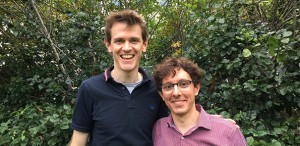 After working on his MSc thesis under the supervision of Tim since 2015, Jose sucessfully submitted and defended his thesis last week – congrats on a great job, Senor Romero! Jose will be finishing off the project with us over the next couple of weeks, after which we will submit the work of him and Tim – stay tuned for a neat piece of molecular pharmacology!
After working on his MSc thesis under the supervision of Tim since 2015, Jose sucessfully submitted and defended his thesis last week – congrats on a great job, Senor Romero! Jose will be finishing off the project with us over the next couple of weeks, after which we will submit the work of him and Tim – stay tuned for a neat piece of molecular pharmacology!
Welcome Chow
Chow is an ion channel expert joining from the University of Sydney, Australia, who will be working on a new project in the lab. Welcome, looking forward to having you around!
Tim talks
Tim was invited to give a talk at the “Novel approaches to probe the molecular function of ion channels from the nicotinic superfamily” symposium at the Physiological Society Meeting in Dublin – see link here.
Congrats to Federica. Again.
Thanks to fellowships from the Lundbeck Foundation and the organising committee, Federica gets to attend the Genetic Code Expansion workshop and conference in August in Oregon. Check out the meeting details here.
Congrats. To Tim. Again.
Tim gets voted next Ion Channel GRS chair by his peers! Congrats and we look forward to a great GRS program in 2018 then!
Congrats to Tim
Tim had the honor of being seletced for a talk at the Ion Channel GRS in South Hadley, MA – congrats!
Farewell Alba and Vaida
We´d like to say thanks to both Alba and Vaida for all their help and contributions in the lab and we wish them all the best for their future!
Congrats to Jianmin
Jianmin receives a “Visiting Professor” grant from the Lundbeck Foundation in relation to his stay with us over the summer – congrats!
It´s a tradition
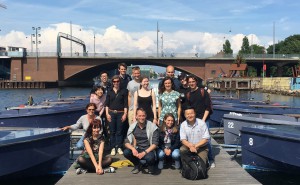 Despite the unpredicabtle weather conditions, we were lucky enough to catch some sun during our annual boat outing. While testing the nerves of some of the tour boat operators, we managed to successfully navigate through various canals and managed to safely return to shore – we´ll be back in 2017!
Despite the unpredicabtle weather conditions, we were lucky enough to catch some sun during our annual boat outing. While testing the nerves of some of the tour boat operators, we managed to successfully navigate through various canals and managed to safely return to shore – we´ll be back in 2017!
Welcome Keith
We welcome Keith to the lab, who will be joining us for a 2-year postdoc. Originally from Singapore, Keith joins us from Melbourne, where he has been very productive working on all sorts of ion channel and peptide-related projects – looking forward to having you around!
Novo Nordisk Foundation Symposium Grant
Together with Hanne Poulsen (Aarhus), Stephan was granted a Novo Nordisk Foundation Symposium Grant on “New paradigms in fluorescence-based approaches to study membrane proteins” in 2017 – more details to follow later in the year, but rest assured we will do everything we can to put together an exiting program!
Welcome Anna
Anna will be joining us over the summer from Darmstadt, Germany, to do some electrophysiology – welcome, and we look forward to having you around!
Welcome Vaida
Vaida, who just finished her PhD at KU, is an expert in worm genetics and will learn some ephys while in our lab over the summer. Welcome, and we look forward to learning more about worms and genetics from you!
Welcome Prof Jianmin Cui
It is our great plasure to host Prof Jianmin Cui, Spencer T. Olin Professor of Biomedical Engineering at Washington University in St. Louis over the summer in our laboratory. Jianmin is an expert in ion channel biophysics and we very much look forward to having him (and his expertise) around for the next couple of months!
Talk in Frankfurt
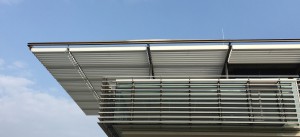 Thanks to an invitation by the ‘Membrane Transport’ consortium at the MPI/University in Frankfurt, Stephan had the pleasure to meet with and talk to members of one of the German strongholds in membrane protein structure and function research – a big thank you to the hosts Misha, Inga, Robert and Marina for a terrific visit!
Thanks to an invitation by the ‘Membrane Transport’ consortium at the MPI/University in Frankfurt, Stephan had the pleasure to meet with and talk to members of one of the German strongholds in membrane protein structure and function research – a big thank you to the hosts Misha, Inga, Robert and Marina for a terrific visit!
Welcome Lea
This week, we have the pleasure of introducing Lea Sørensen to our team – Lea will be helping us as a Research Assistant until the summer. Welcome on board!
Biophysical Society meeting 2016
Courtesy to travel awards to Federica (Biochemical Society), Matthias (Lundbeck) and Tim (DFF), we were able to treck across the pond with quite a few lab members this year. Greeted by sunny and warm weather, it quickly became clear that – thanks to a busy program – we would not have time to indulge in either. Instead, we were treated to an excellent meeting, with very successful poster presentations by Nina, Federica and Matthias.
Welcome Nina and Alba
After a very productive MSc thesis last year, Nina returns as a PhD student this week. Alba joins us from Spain for an internship over the summer. Welcome both, we´re very much looking forward to having you around!
Welcome Britt
We´re very happy to be joined by Britt, who will stay with us for the coming year as a laboratory technician intern. Hailing from New Orleans, Britt is the latest addition to the team and will help us cope with the growing demand in help with molecular biology. Welcome to the crew!
Federica is back
After 3 months in Strasbourg, Federica returns with plenty of single channel data – and awards from Oticon, A.P.Møller, Augustinus, Knud Højgaards and Christian og Ottilia Fonden, supporting her work over there. Congrats on a very productive and successful trip!
Ligand Recognition and Molec. Gating GRC
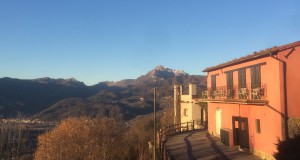 This years edition of the Ligand Recognition & Molecular Gating GRC took place in Tuscany and featured a spectacular line up of speakers. Despite the mostly gloomy weather, the meeting was very inspiring and extremely informative for anyone into molecular aspects of membrane protein structure and function – big props to the organisers for putting together a great program!
This years edition of the Ligand Recognition & Molecular Gating GRC took place in Tuscany and featured a spectacular line up of speakers. Despite the mostly gloomy weather, the meeting was very inspiring and extremely informative for anyone into molecular aspects of membrane protein structure and function – big props to the organisers for putting together a great program!
We´re looking for postdocs!
Interested in working with us a postdoc? If you have an exceptionally strong background in electrophysiology or would like to apply your chemical biology expertise to ion channels, apply here.
New paper for the lab
Together with our colleagues in Oxford, we just published a manuscript in ACS Chemical Neuroscience on the role of an absolutely conserved pair of tryptophan side chains in Cys-loop receptors – congrats to all involved, in particular Nina and Tim! Find the link here.
Welcome Christian. Again.
After his brief stint as a Research Assistant, we are extremely happy to welcome Christian as our new PhD student. The Copenhagen local is an expert biochemist with plenty of experience with proteins – and thus a perfect match for our team. Welcome, Christian!
Symposium on novel approaches in ion channel research
We recently had the pleasure to host a DRA & Center for Biopharmaceuticals minisymposium entitled “Thinking outside the box – Novel approaches to study ion channels”. The event included lectures by Prof. Chris Ulens (Leuven, Belgium), Dr. Thomas Berger (Bonn, Germany) and Prof. Friedrich Koch-Nolte (Hamburg, Germany) and covered a wide array of novel approaches to study ion channels, incl. fluorometry, crystallography, fragment-based screening and nanobodies. The event provided a beautiful showcase of how implementation of recent technical advances can lead to exciting new findings, both with regards to functional and pharmacological studies on ion channels.
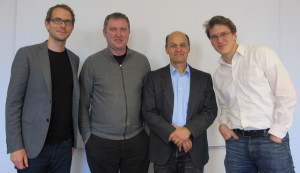 Stephan along with Profs Ulens, Koch-Nolte and Berger (from left)
Stephan along with Profs Ulens, Koch-Nolte and Berger (from left)
Welcome Christian
Christian Bernsen Borg will be joining us as a research assitant, before starting his PhD with us later in the year. Christian is a Copenhagen native and an expert in proteins, thus making for a great addition to our team!
Goodbye to Vitaly
We´re sad to have to say goodbye to Vitaly – but at the same time we´re very excited to see him leave for such an great job at Novo and wish him all the best for his future!
It really was fantastic to have you around, Vitaly, and we will certainly miss you!
Experts in town
After months of planning, the big day had finally come: Oct 6th, the day of the “Hot topics in protein medicinal chemistry” symposium. The line-up was absolutely world class and I think it´s safe to say nobody in the audience went home disappointed – the lectures were absolutely outstanding and extremely inspirational! More coverage of the event can be found here!
More travel for Stephan
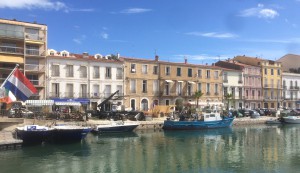 Stephan had the pleasure to be invited to the annual meeting of both the French and the Spanish ion channel communities – two fantastic showcases of the exciting ion channel work being done in the warm south! Thanks very much to the organisers for arranging great meetings!
Stephan had the pleasure to be invited to the annual meeting of both the French and the Spanish ion channel communities – two fantastic showcases of the exciting ion channel work being done in the warm south! Thanks very much to the organisers for arranging great meetings! 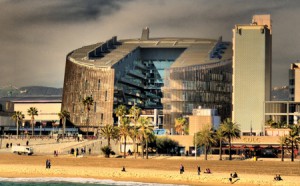 (Photo credit: PRBB, likely the research institute with the best location ever – in the center of Barcelona, only meters from the beach…)
(Photo credit: PRBB, likely the research institute with the best location ever – in the center of Barcelona, only meters from the beach…)
It took a while
We´re happy to report the publication of the (likely first) book on how to apply chemical biology approaches to ion channel research – published by Springer, the work can be find under this link. We were very fortunate to be able to recruit world-leading experts to contribute to the book and hope it will find widespread application in the field!
Thanks for the feature
Our latest work on potassium channels modulators just got featured in a science blog – find the details here
New publication
Together with our colleagues in Canada, the US and Germany, we have published our latest work in Nature Communications. The work directly shows how a recently marketed anti-epileptic drug elicits its action on a neuronal ion channel. Using synthetic amino acids, we were able to show that the drug, retigabine, binds to the channel primarily via a single hydrogen bond. Curiosly, the H-bond donor within the channel turned out to be the indole nitrogen of a tryptophan side chain, constituting a previously undescribed mechanism of a drug-receptor interaction. Ongoing research in our group, in collaboration with partners from both industry and academia (in Denmark, Canada and Germany), now focuses on complementing this work with detailed SAR studies of retigabine – see also current MSc projects.
New grants
We were fortunate enough to receive grant support for purchasing new equipment from the Beckett Foundation, Brodrene Hartmann Foundation and the Hørslev Foundation – we are very grateful for their support!
Goodbye to Nina and Michael
In the past week, we said goodbye to both Nina and Michael, who did an outstanding job in the lab over the last couple of months! While Nina decided to head home the hard way (1200 km by bike), Michael had no choice but to hop on a plane back to the West Coast…
Congrats to Federica
Federica won the poster competition amongst the 2nd year PhD students at the DRA Summer School 2015 – congrats on a job well done! See the link for details
New paper
Together with our friends in Edmonton and Iowa, we have just had a paper accepted at Nature Communications – congrats to all involved. Details to follow follow soon!
Talk at UCL
Thanks to Lucia Sivilotti, the leading glycine receptor single channel aficionado (see her recent award lecture on the topic here), Stephan had the pleasure of being invited to UCL for a talk. This meant getting a chance to catch up with some of the world-leading ion channel experts in what has to be the at one of the strongest ion channel/neuroscience departments around – thanks for a great visit.
Lab retreat
As our inaugural lab retreat, we left Copenhagen to not only discuss the latest science going on in the lab, but also to check out some massive underground features in nearby Hamburg. More precisely, the tunnels of DESY – built to enlighten us science nerds on all sorts of fancy topics, ranging from our X-ray crystallography of biomolecules (which we are known to occasionally deal with) to quarks, gluons, dark matter and quite literally the big bang itself…
Open PhD position
We currently have a PhD position available for a highly motivated student – check out the details here.
A special guest
We had the great pleasure of welcoming Prof Joe Lynch to town this week. One of the leading glycine receptor experts around, he also was responsible for much of the scientific training of Tim and Stephan, who both did their PhDs with him. More info on Joe can be found here.
Sailing, Viking style
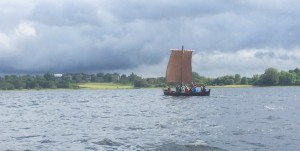 Despite the daunting weather forecast, the members of the Center for Biopharmaceuticals took to the sea at Roskilde in a boat replica of what would have been used by the Vikings a long while back – a fun ride that definitely instilled a lot of respect for those who used tiny boats like these to brave the open waters of the North Sea!
Despite the daunting weather forecast, the members of the Center for Biopharmaceuticals took to the sea at Roskilde in a boat replica of what would have been used by the Vikings a long while back – a fun ride that definitely instilled a lot of respect for those who used tiny boats like these to brave the open waters of the North Sea!
Welcome!
Jose will be working on his MSc thesis with us as part of his MSc degree in Human Biology (here at KU), while Michael is an undergraduate student from the University of British Columbia who is visiting us for the summer – welcome on board, gentlemen!
Jason Chin in Aarhus
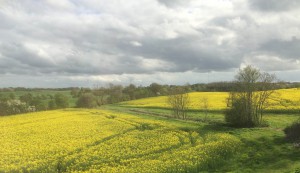 Vitaly and Stephan got on the train to Aarhus to attend a talk by Jason Chin from Cambridge. After a pleasant ride through the beautiful Danish spring, there were treated to an outstanding lecture about the possibilities of using an expanded genetic code to address a wide variety of chemical and biological questions – very inspiring indeed! Learn more about Jason Chin´s work here.
Vitaly and Stephan got on the train to Aarhus to attend a talk by Jason Chin from Cambridge. After a pleasant ride through the beautiful Danish spring, there were treated to an outstanding lecture about the possibilities of using an expanded genetic code to address a wide variety of chemical and biological questions – very inspiring indeed! Learn more about Jason Chin´s work here.
Finally.
After numerous delays and many disruptions, we are delighted to announce that our lab space is finally completely ready for use! Many thanks to all involved in this process – we are delighted with our new playground!
Talk at the Gage Conference
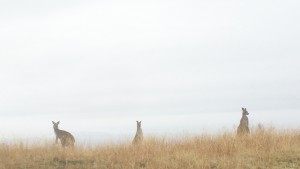 Stephan had the honour of being in invited to give a talk at the Gage Conference in Canberra, Australia. Although this meant spending an awful lot of time on airplanes, it was definitely worth every minute, given the very fruitful interactions with collaborators and friends – on top of the many exciting talks at the meeting. A big thank you to Brett, for making this trip possible!
Stephan had the honour of being in invited to give a talk at the Gage Conference in Canberra, Australia. Although this meant spending an awful lot of time on airplanes, it was definitely worth every minute, given the very fruitful interactions with collaborators and friends – on top of the many exciting talks at the meeting. A big thank you to Brett, for making this trip possible!
Vitaly joins the lab
Vitaly Komnatnyy joins the lab as a postdoc and resident chemist, and endows the lab with some long-anticipated chemistry expertise. After finishing his studies at the prestigous Lomonosov Moscow State University, Vitaly moved to Denmark to do his PhD at DTU – where he also went on to do a brief postdoc – before deciding to join our lab. Welcome on board, Vitaly, we´re very happy to have you around!
Upcoming symposium
We are very proud to announce an – as we think – inspiring line up for the first ever Center for Biopharmaceuticals symposium on “Hot Topics in Chemical Biology” on Oct 6th 2015, find the flyer here. Attendance is free and only requires a simple registration email, so keep a free spot in your calendar for this exciting event!
Big day for Tim
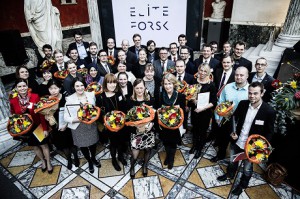 Tim got to mix and mingle among Danish Royalty and Ministers as he receives the coveted Sapere Aude DFF Research Talent award – congrats and well done! Find the link to the event here
Tim got to mix and mingle among Danish Royalty and Ministers as he receives the coveted Sapere Aude DFF Research Talent award – congrats and well done! Find the link to the event here
A good month
It´s been a very productive month, with lots of progress and exciting results on all ongoing projects – thanks for the hard work, everyone!
A new toy
After variuos delays, missing equipment and a lots of fiddling with leaky chambers we now have our third e-phys rig up and running – a big thank you to Matthias and Nina. And to Karsten for putting up with all our special workshop requests!
Talk in Aachen
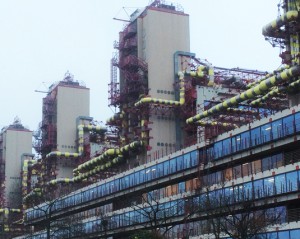 No doubt, the hospital of Aachen, Germany has some of the most outrageous architecture imaginable. Not only does the outside look somewhat unique, architects really went to town on the inside, too, where they stuck almost exclusively to green floors, doors and walls – only interspersed by the odd silver wall or neon-colored door. Together, this provided a very unique backdrop to a very inspiring visit and many fruitful discussions with fellow ion channels aficionados that Stephan had the pleasure of meeting. Thank you, Stefan, for a great visit in Aachen!
No doubt, the hospital of Aachen, Germany has some of the most outrageous architecture imaginable. Not only does the outside look somewhat unique, architects really went to town on the inside, too, where they stuck almost exclusively to green floors, doors and walls – only interspersed by the odd silver wall or neon-colored door. Together, this provided a very unique backdrop to a very inspiring visit and many fruitful discussions with fellow ion channels aficionados that Stephan had the pleasure of meeting. Thank you, Stefan, for a great visit in Aachen!
Say hi to Nina and Matthias
While Matthias embarks on his PhD, Nina will be joining us for her MSc – welcome to the lab! Oh, and their profiles will follow shortly!
He did it again.
The good news just keep on coming for Tim, who was just awarded a Sapere Aude DFF Research Talent award – congratulations, what a great pre-Christmas gift! Read the full story here.
A major milestone
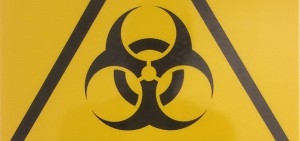
Thanks to Janne’s efforts, we now have obtained GMO approval for our new lab lab space – a major milestone on our long and rocky road to being fully operational! To make things better, we were also finally able to provide Tim’s rig with a new home on the first floor. Thanks to everyone for their hard work – and for their patience!
Good news
The lab receives a grant from the Novo Nordisk Foundation – we’re very honored and look forward to putting it to good use!
Launch of ATPsignal.com
The newly launched ATPsignal website represents the web presence of this interdisciplinary consortium of research groups that aims to unravel the enigmatic role of P2X7 receptors in human health and disease. Using highly complementary approaches ATPsignal will cover a broad range of P2X7 receptor biology, ranging from the atomic level to its role in organs and intact animals
Talk in Santa Cruz
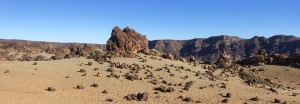
Stephan had the pleasure of being invited to give a talk at the Universidad de La Laguna on Teneriffe. The island not only boasts breathtaking landscapes but also some of the finest ion channel labs around, making for a very worthwhile visit! Thanks for the invitation, Teresa!
Ming joins the lab
Ming is a PhD student from the University of Queensland, Australia, who will be doing some work with unnatural amino acids in our lab for a couple of weeks – welcome in the lab!
Congrats to Tim. Again.
Tim just secured a postdoctoral fellowship from the Lundbeck Foundation – someone is clearly on a roll these days. Stort tillykke, Tim!
Talk at the caesar in Bonn
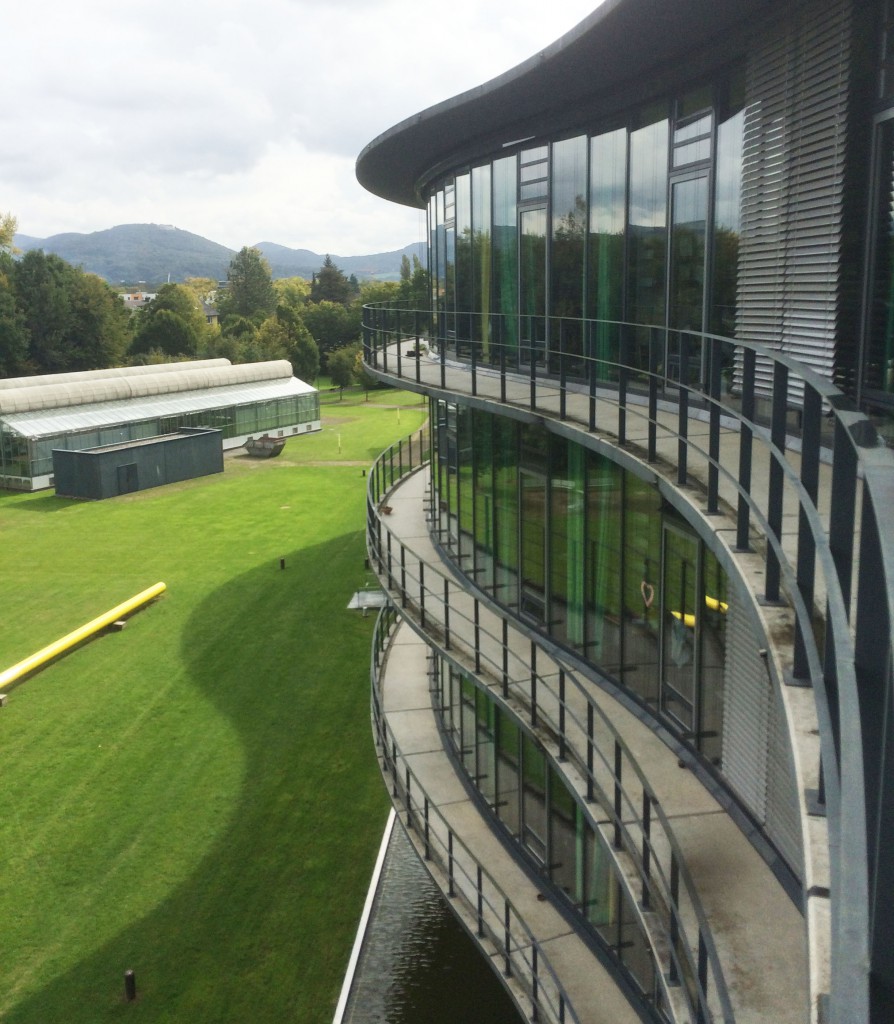
The offices at this remarkable place must have one of the best views ever. No less impressive is the science done around there, making for a great visit – thanks for the invite, Thomas!
Congrats to Tim!
Tim just secured himself a coveted postdoctoral fellowship from the DFF – a fantastic (and well-deserved) achievement! Check out the official DFF news release here
Open PhD position
We have available a PhD Fellowship in Ion Channel Electrophysiology starting December 2014 – click here to see the details
Lab summer outing
Motivated by the beautiful summer weather we decided to take to the waters of the harbor for a little self-guided tour of the local attractions. Given we´re in Copenhagen it was only appropriate that we were powered by an über-environmentally friendly outboard engine delivering a whopping 12 V (from solar power-charged batteries, of course). We, on the other hand, were fueled by delicious smørrebrød and local brews, making for fun afternoon out on the water. We certainly hope to be able to make it a summer tradition!
Say hi to Federica
We´re very happy to announce the arrival of our first PhD student, Federica Gasparri! Originally from Milan, Federica just finished her MSc, which including an extended (and very successful) stay at Oxford Brooks. She has extensive experience with some of our favorite toys (think TEVC and the likes) and already an impressive publication record – check out her profile here!
Seminar at CAU Kiel
Stephan had the pleasure of being invited to give a seminar as part of the ‘Physiological Colloquium’ series at the Christian-Albrechts-University Kiel
First lab meeting with actual data!
Thanks to great efforts by Tim, Janne & Federica we just had our first lab meeting , including some first data from the lab! Thanks guys!
First paper for the lab!
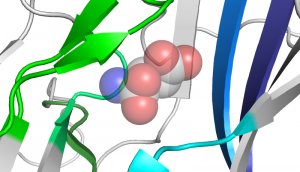
A big thank you to our local expert in ligand-binding in Cys-loop receptors, Tim, for putting together this review for Frontiers in Physiology! Thanks to quite the deluge of research papers on related subjects he was on top of the literature and able to put together a comprehensive update of where the fields stands with regards to molecular recognition of agonists – nice work, Dr Lynagh! Find the manuscript here
Seminar at KU Leuven
Stephan had the honor of being invited to beautiful Leuven for a seminar at KU Leuven
Open PhD position
We have available a PhD Fellowship in Membrane Receptor Pharmacology, Structure & Function starting August 2014 – click here to see the details
GRC Ligand Recognition and Molecular Gating
 The title is already quite the mouthful, but the conference keeps living up to it: a great mix of ion channelologists, transporter people and folks working on pumps mix and mingle for a week under the Californian sun. The highlights were some exciting posters on unatural amino acid incorporation and a few outstanding talks on new horizons in structural biology – looking forward to the 2016 edition (rumor has it the next one will be held in Spain)
The title is already quite the mouthful, but the conference keeps living up to it: a great mix of ion channelologists, transporter people and folks working on pumps mix and mingle for a week under the Californian sun. The highlights were some exciting posters on unatural amino acid incorporation and a few outstanding talks on new horizons in structural biology – looking forward to the 2016 edition (rumor has it the next one will be held in Spain)
Janne joins the lab!
Janne Møgelhøj Colding has started as the labs laboratory technician. She has plenty of experience in both research and general lab management – and she is heading the resident Occupational Health & Safety committee. We could not have asked for a better fit and we´re very honored to have her around. Welcome Janne!
Biophysics Meeting 2014
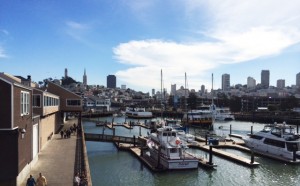 Attending the annual meeting of the Biophysical Society is always fun, even more so when San Francisco is the host city! Plenty of exciting science, meeting old and new friends and copious amounts of post-conference mix and mingle made for a good mix – looking forward to the 2015 edition (despite that one being hosted by Baltimore – in February)
Attending the annual meeting of the Biophysical Society is always fun, even more so when San Francisco is the host city! Plenty of exciting science, meeting old and new friends and copious amounts of post-conference mix and mingle made for a good mix – looking forward to the 2015 edition (despite that one being hosted by Baltimore – in February)
Congrats to Tim. Again.
Propofol is an intravenous general anesthetic that has recently garnered much attention, not least due to its alleged involvement in the death of a certain King of Pop. Tim now shows how this innocent looking compound can both inhibit and enhance currents through some ligand-gated ion channels – doing so via a single site! See the whole story published as a prestigious Brief Communication in The Journal of Neuroscience.
Congrats to Tim
Tim has been invited as a speaker at the ‘Anthelmintics: From Discorvery to Resistance’ Meeting in San Francisco – congrats!
Tim Lynagh joins the lab
Tim Lynagh is the first post doc to join the lab! After finishing his PhD in Australia, the Bundaberg native moved to Germany for his first post doc, before deciding on his move to Copenhagen – welcome Tim, great to have you on board!
Carlsberg Foundation Grant
More good news for the lab, as we just received an equipment grant from the Carlsberg Foundation!
Lundbeck Foundation Fellowship
The lab is very honored to announce a major grant from the Lundbeck Foundation in form of a Lundbeck Foundation Fellowship to Stephan Pless. Check out the video for some glossy info on the project.
Getting closer
The floor plans are ready and the renovations of the lab space are about to start – very exciting times for the lab and its host, the Centre for Biopharmaceuticals.


